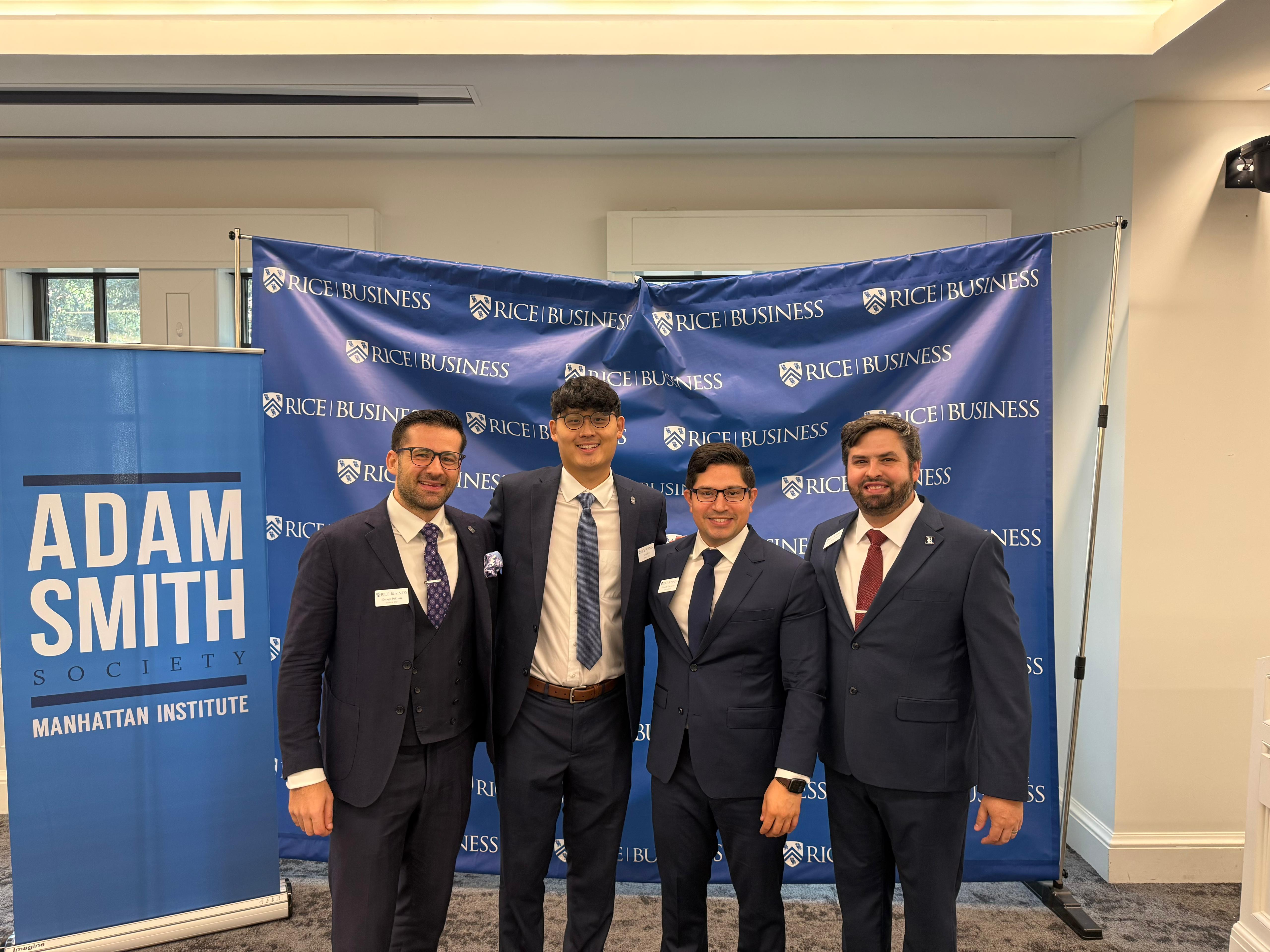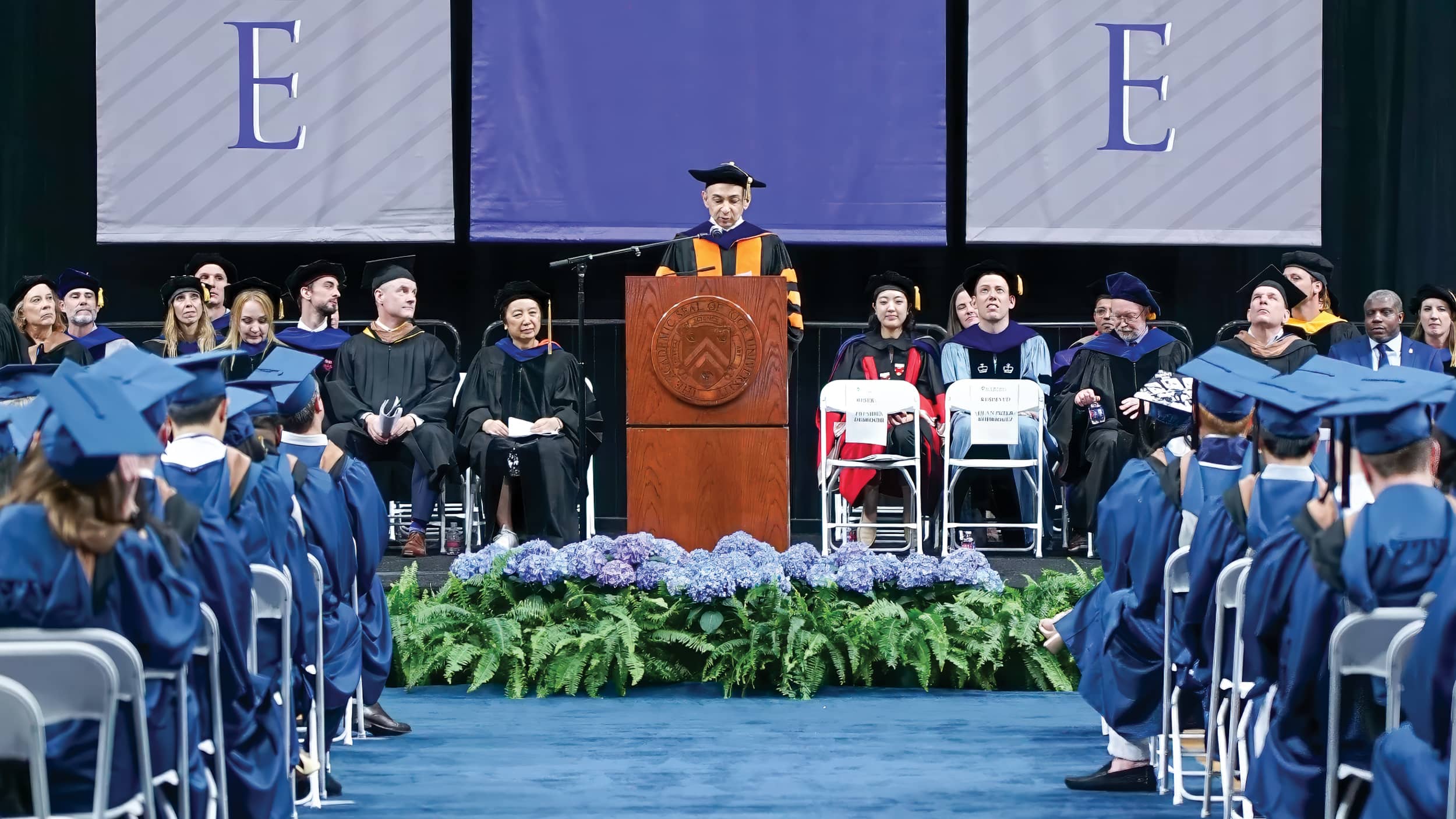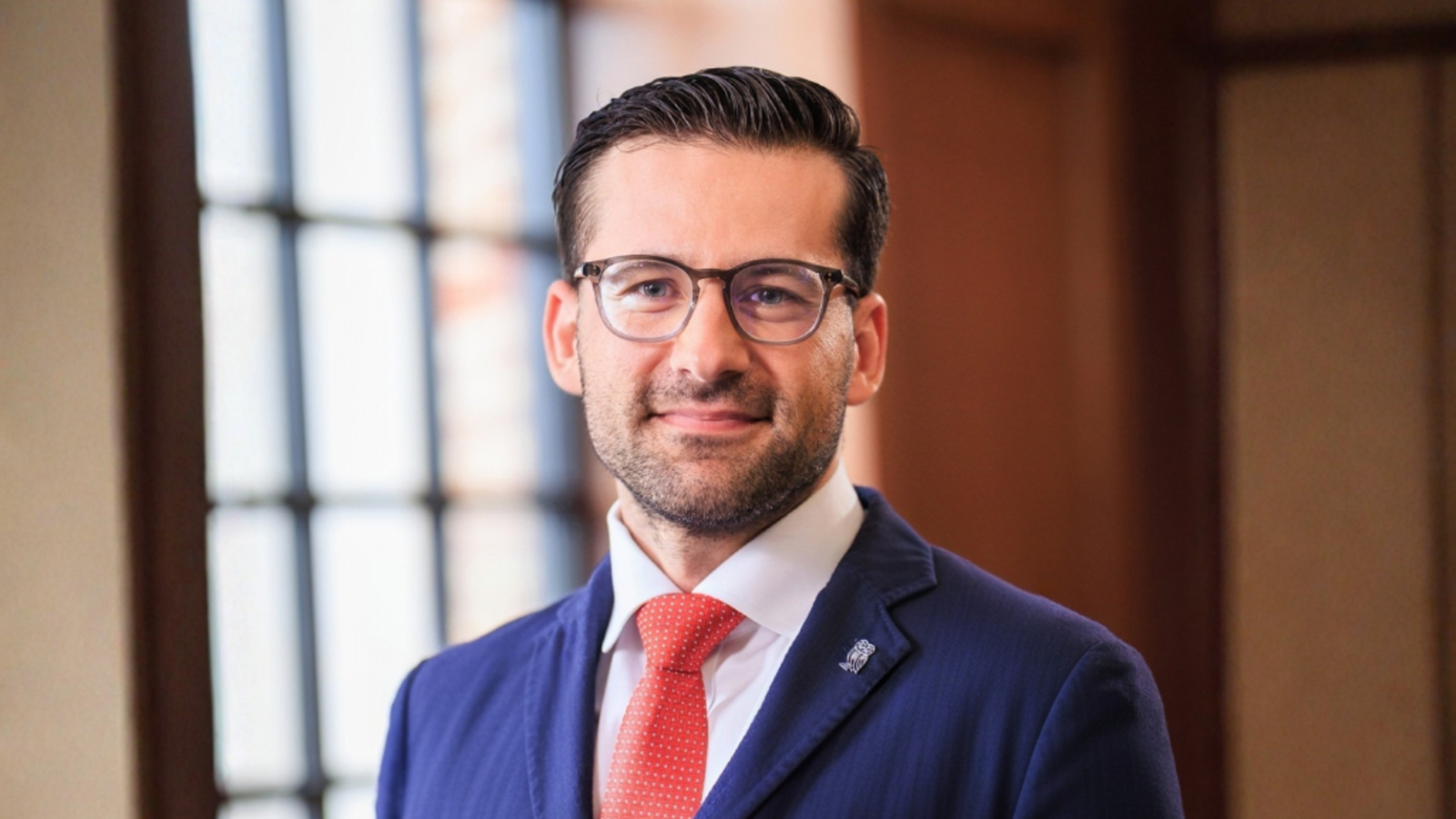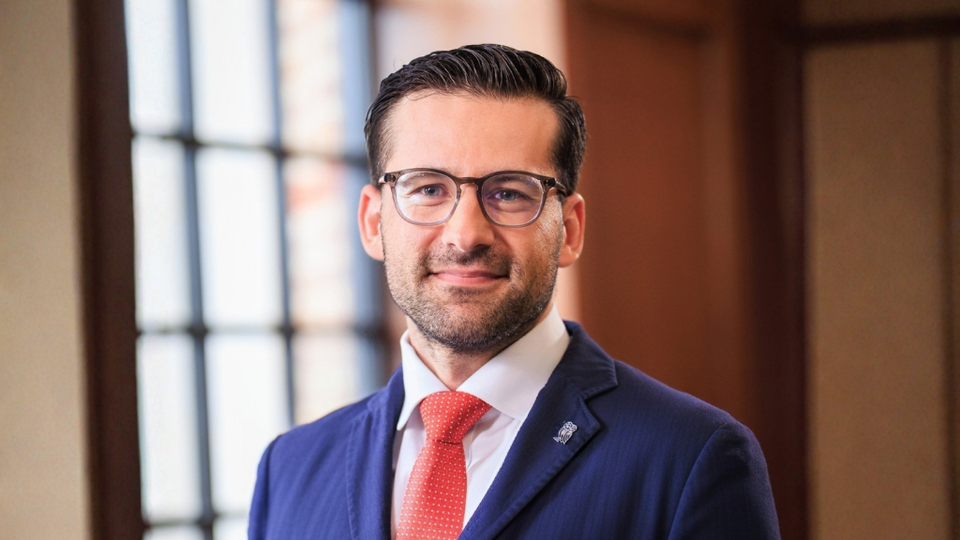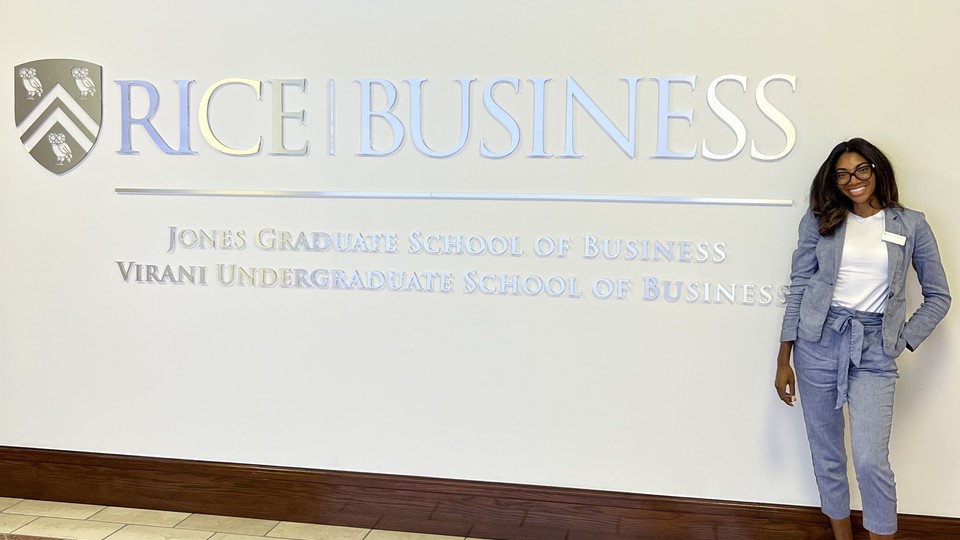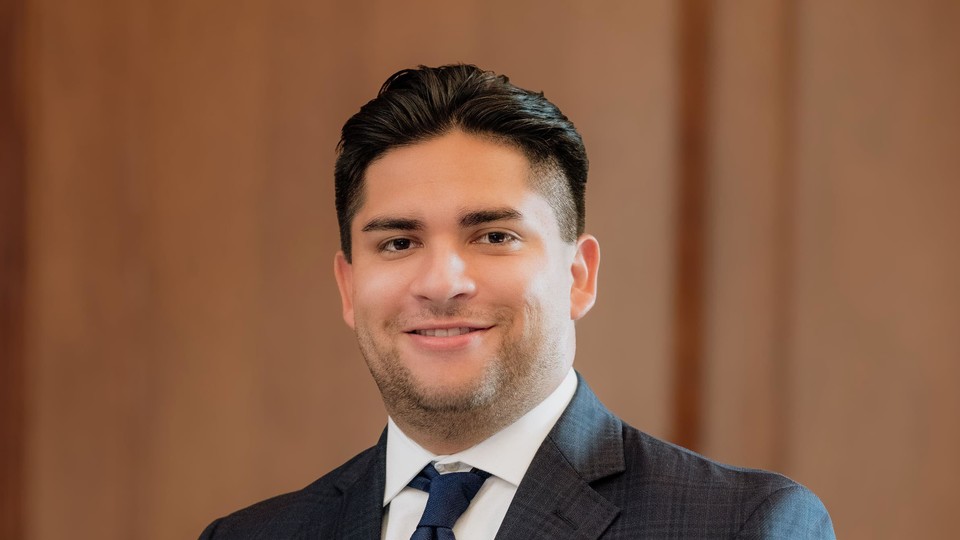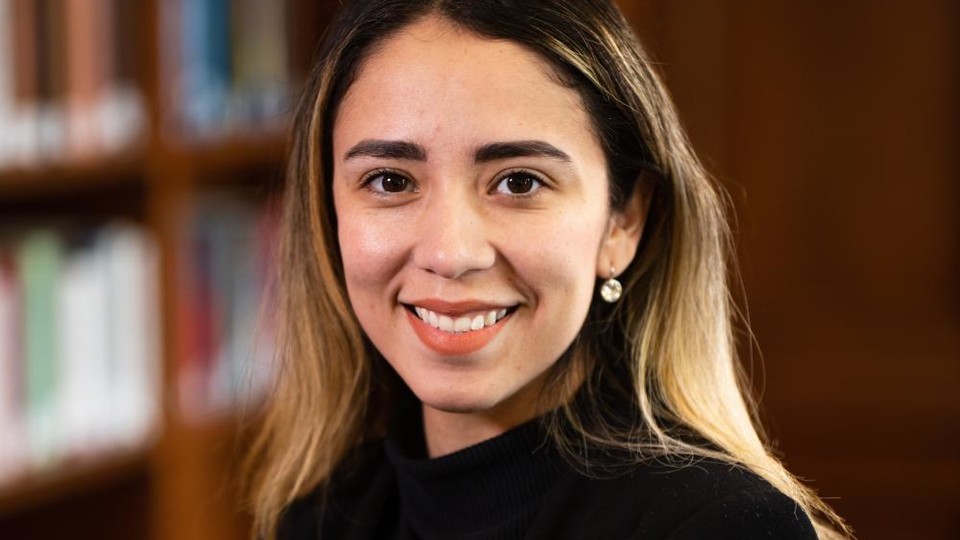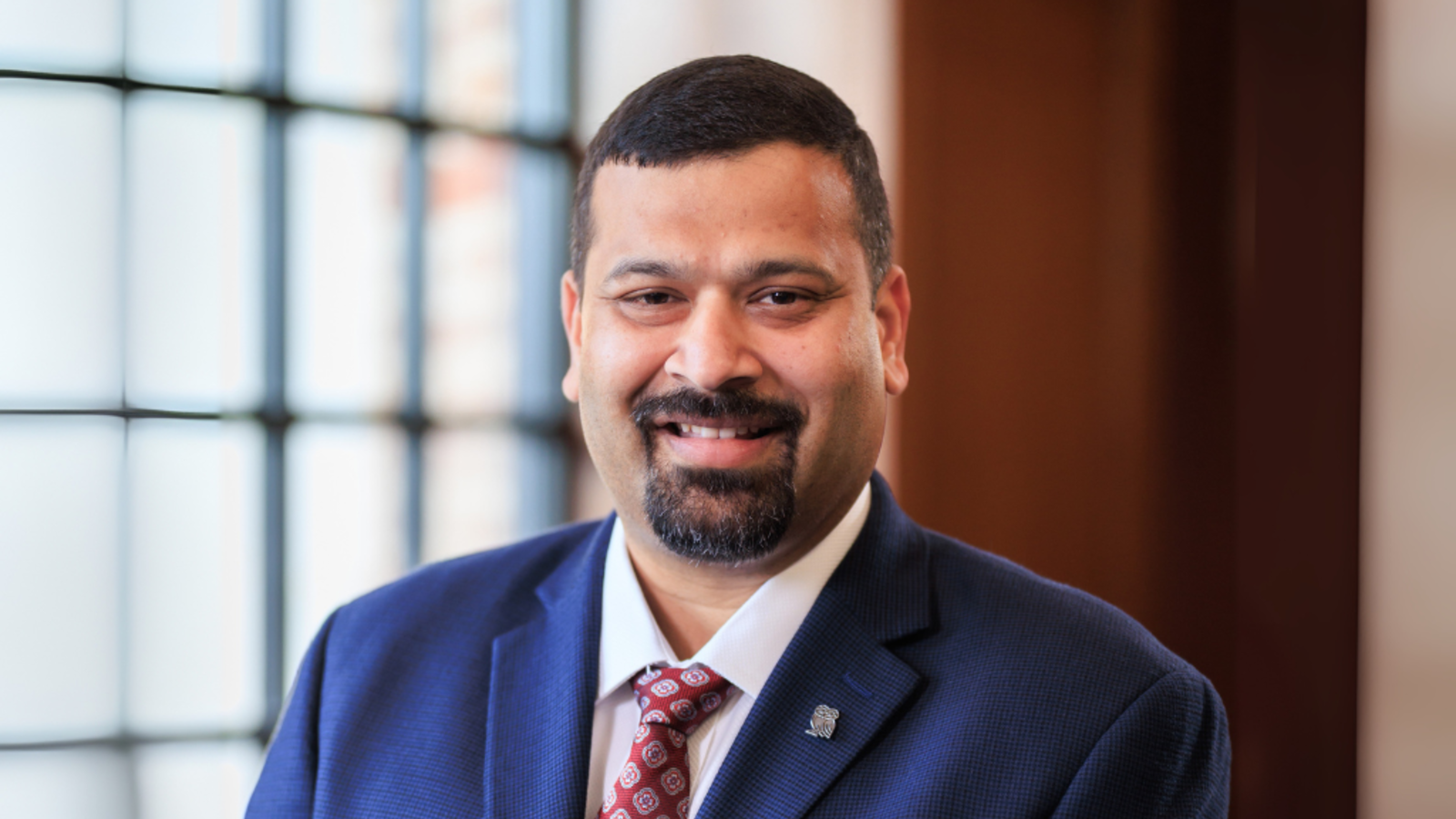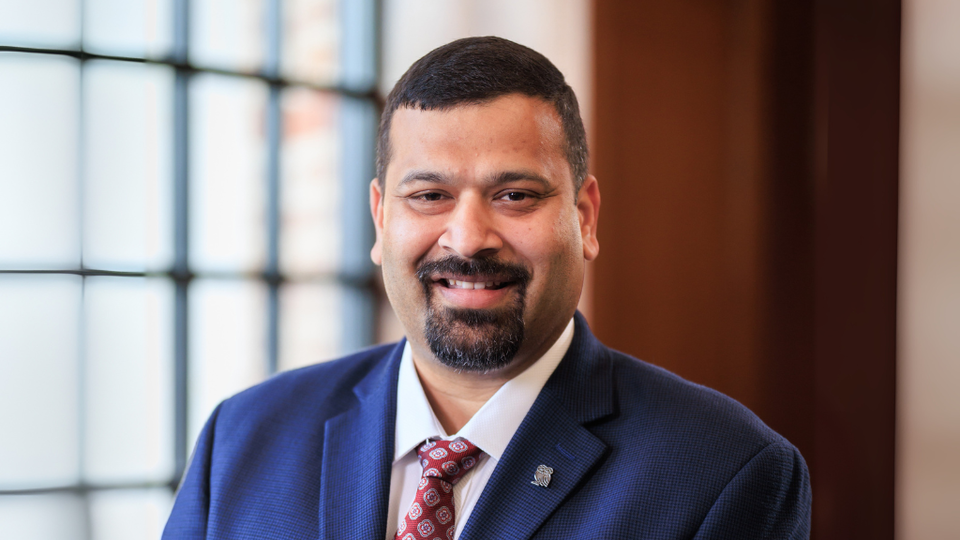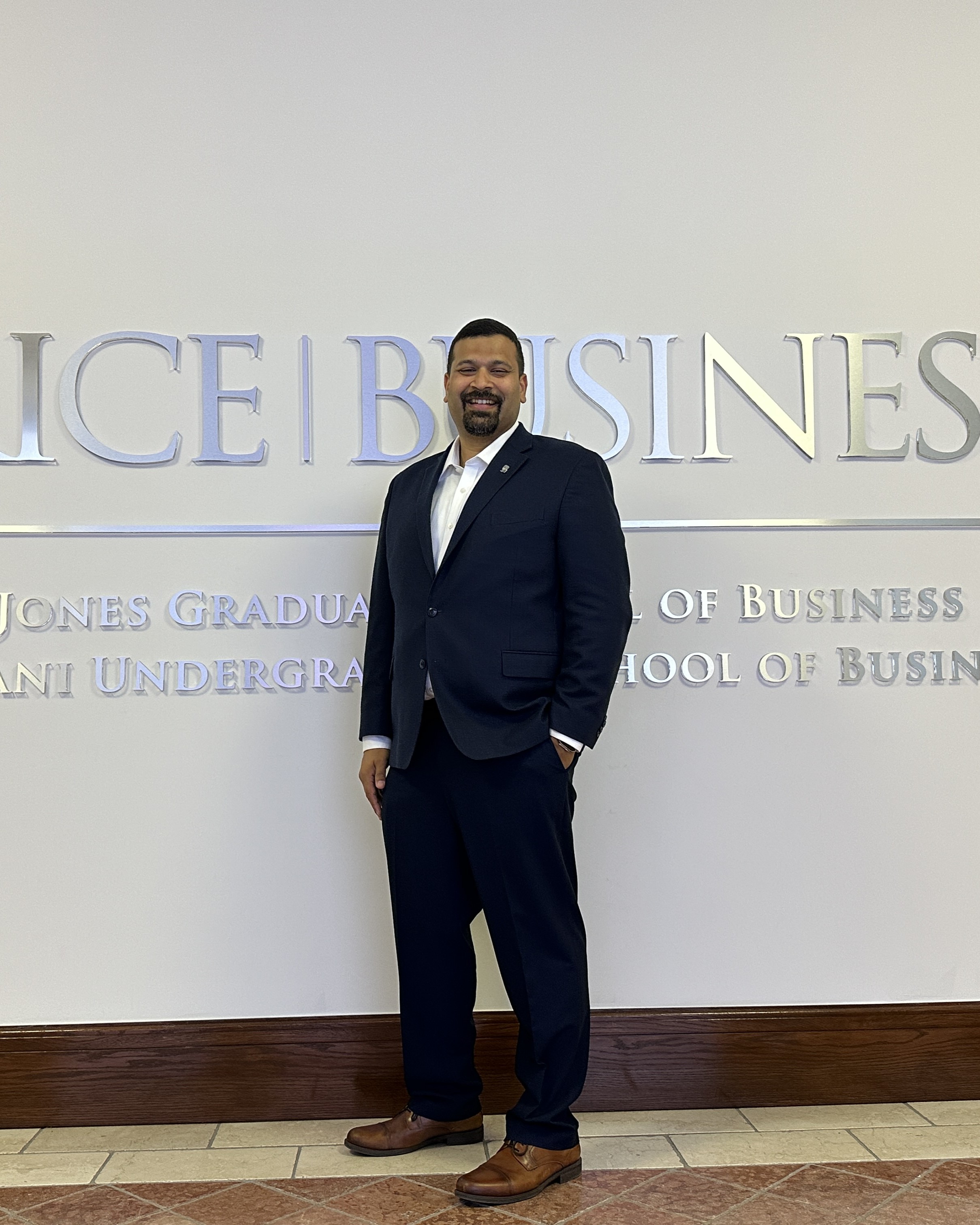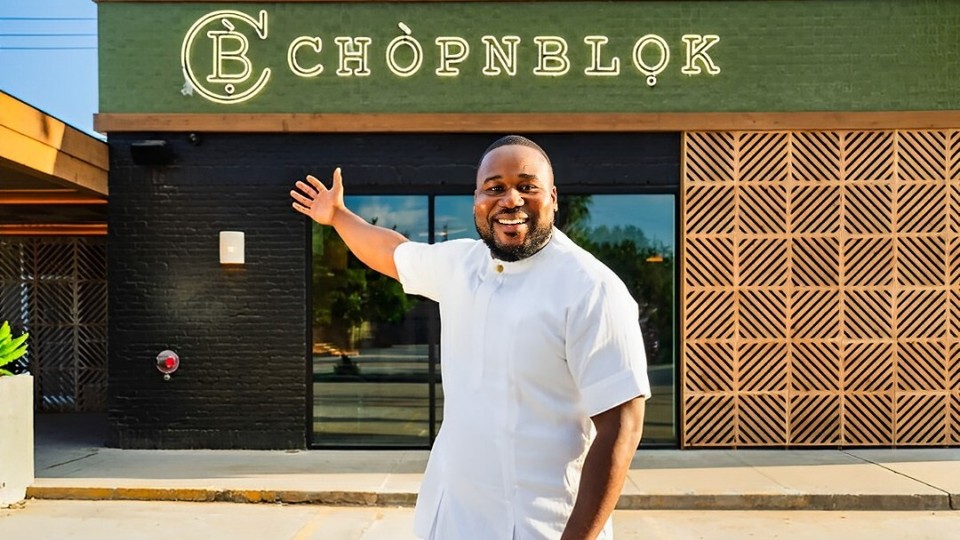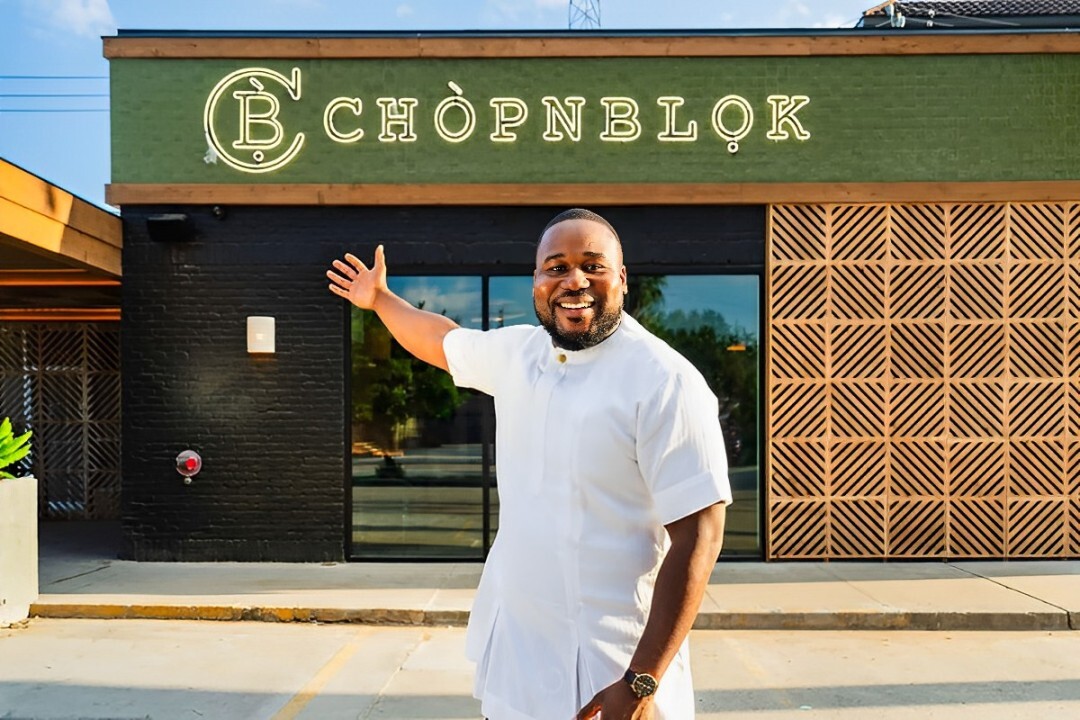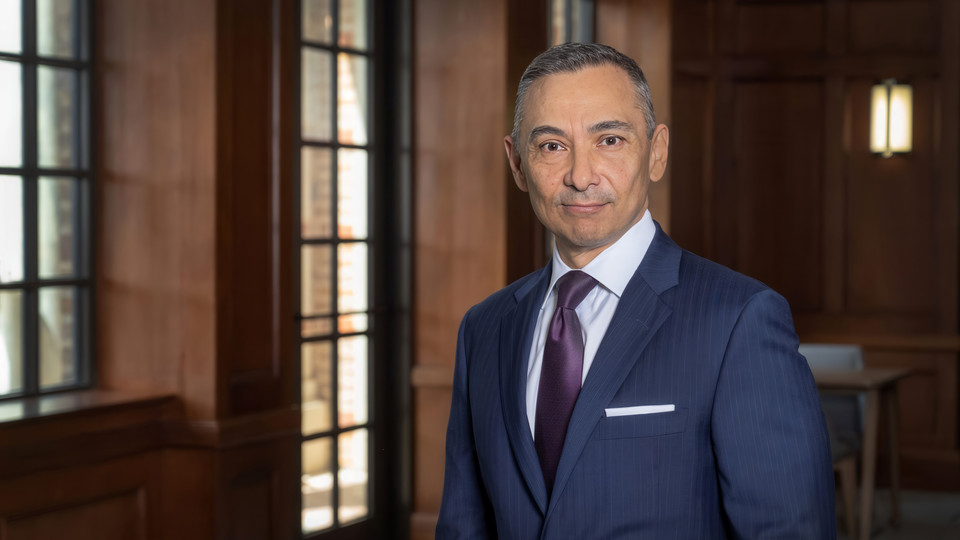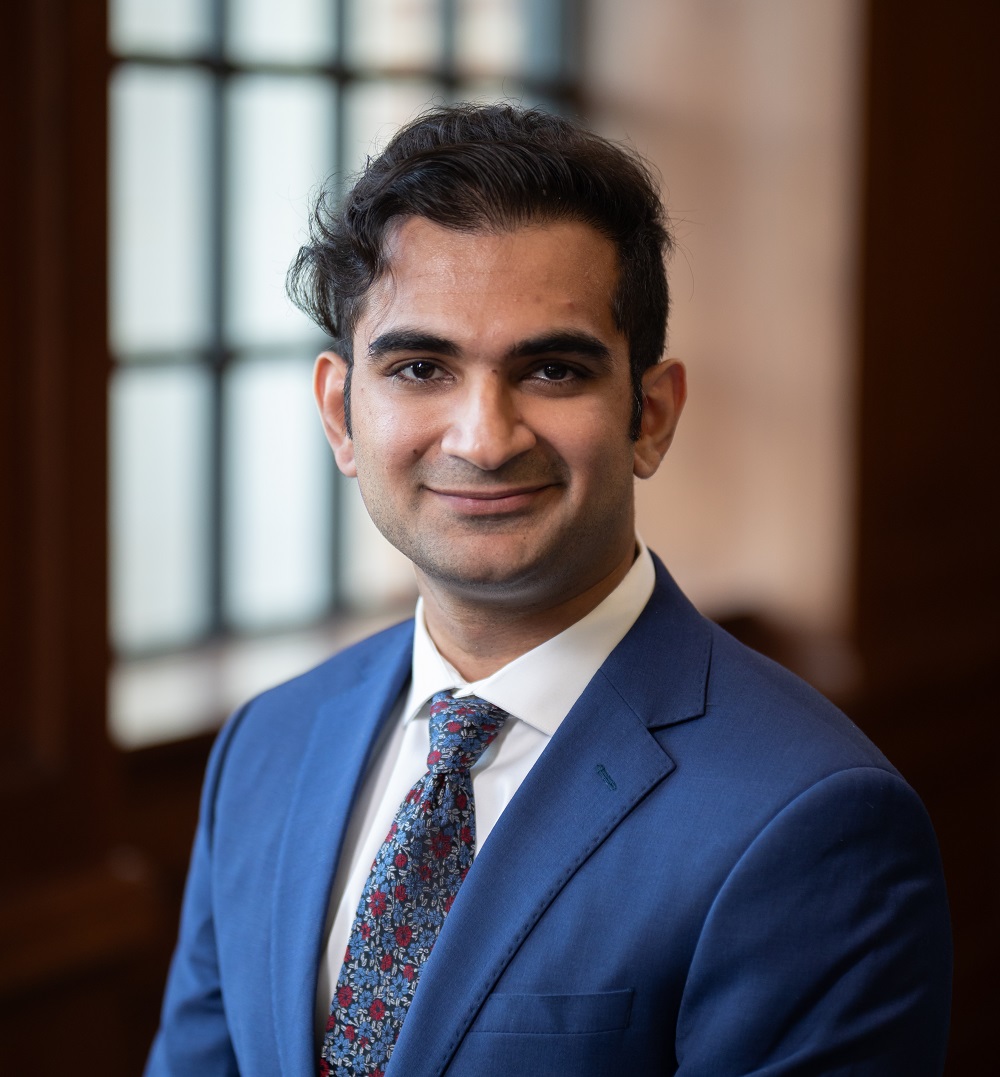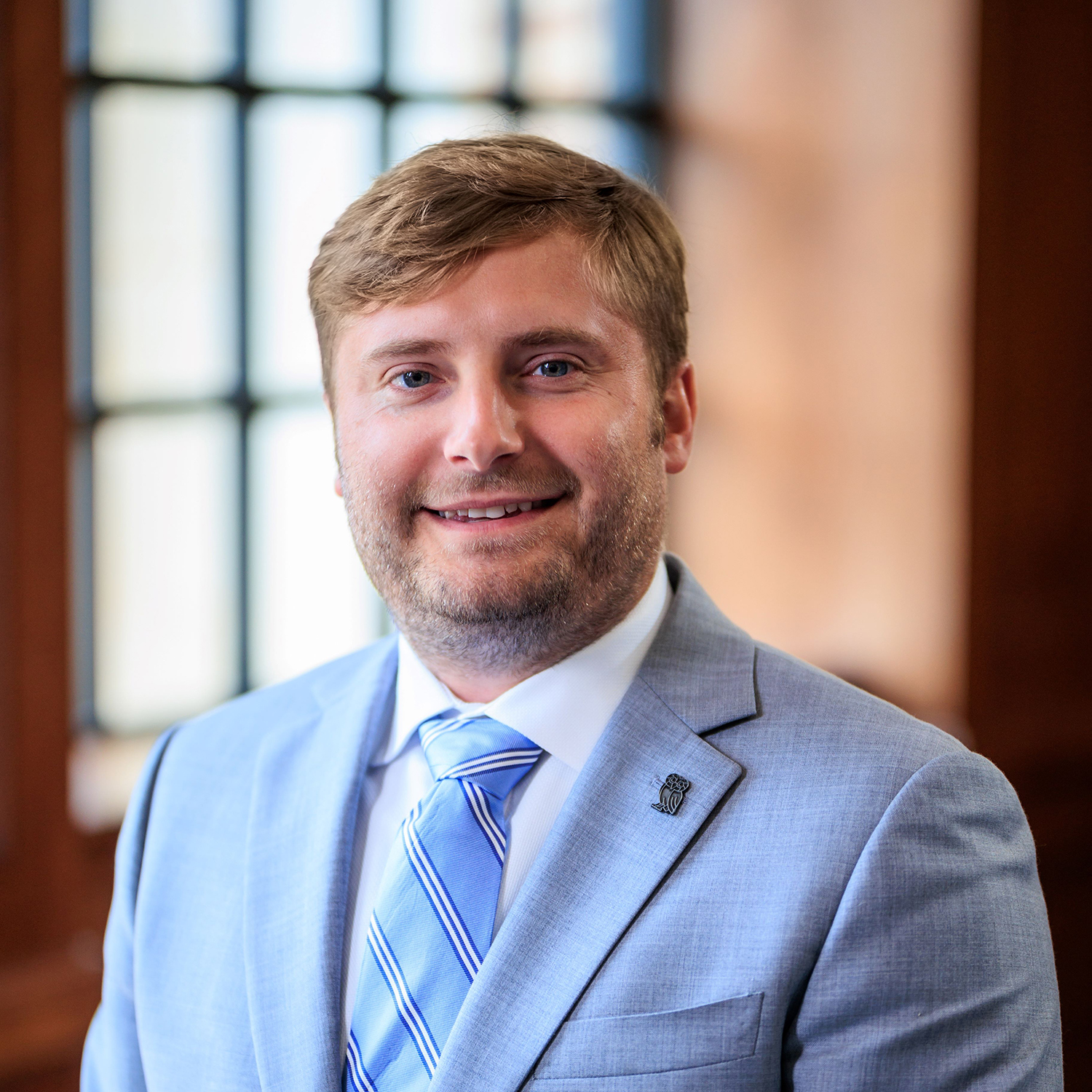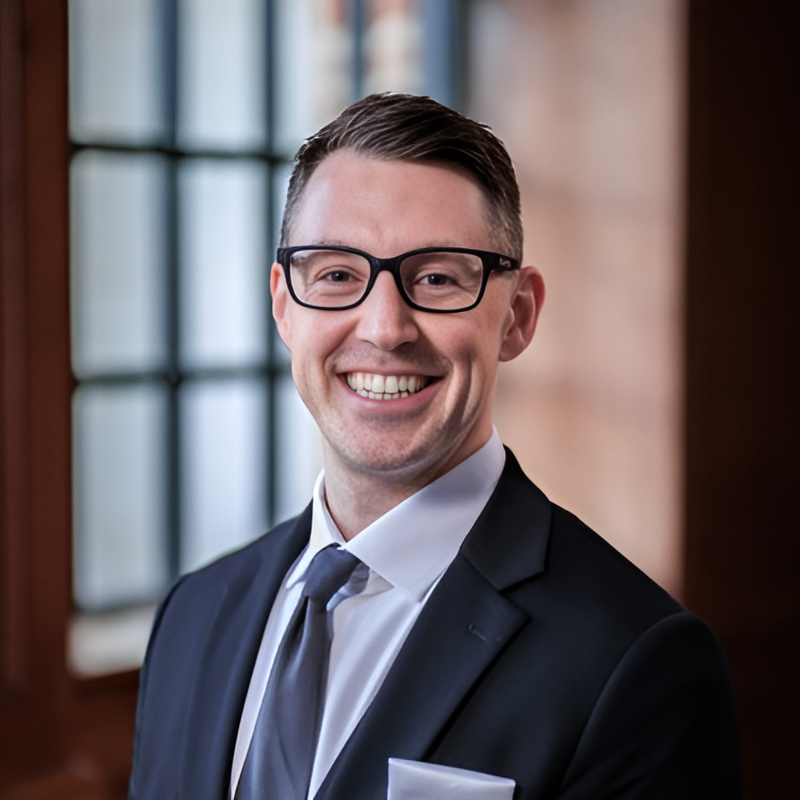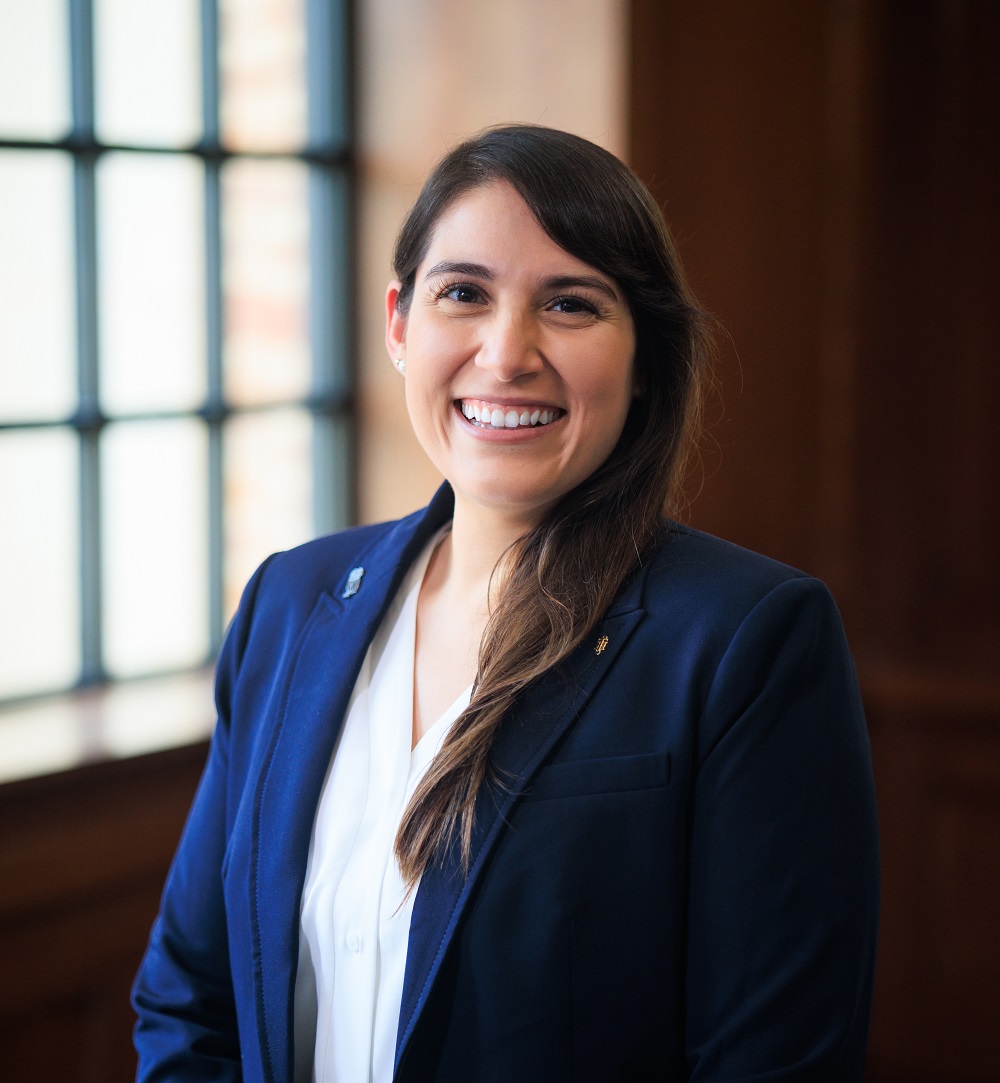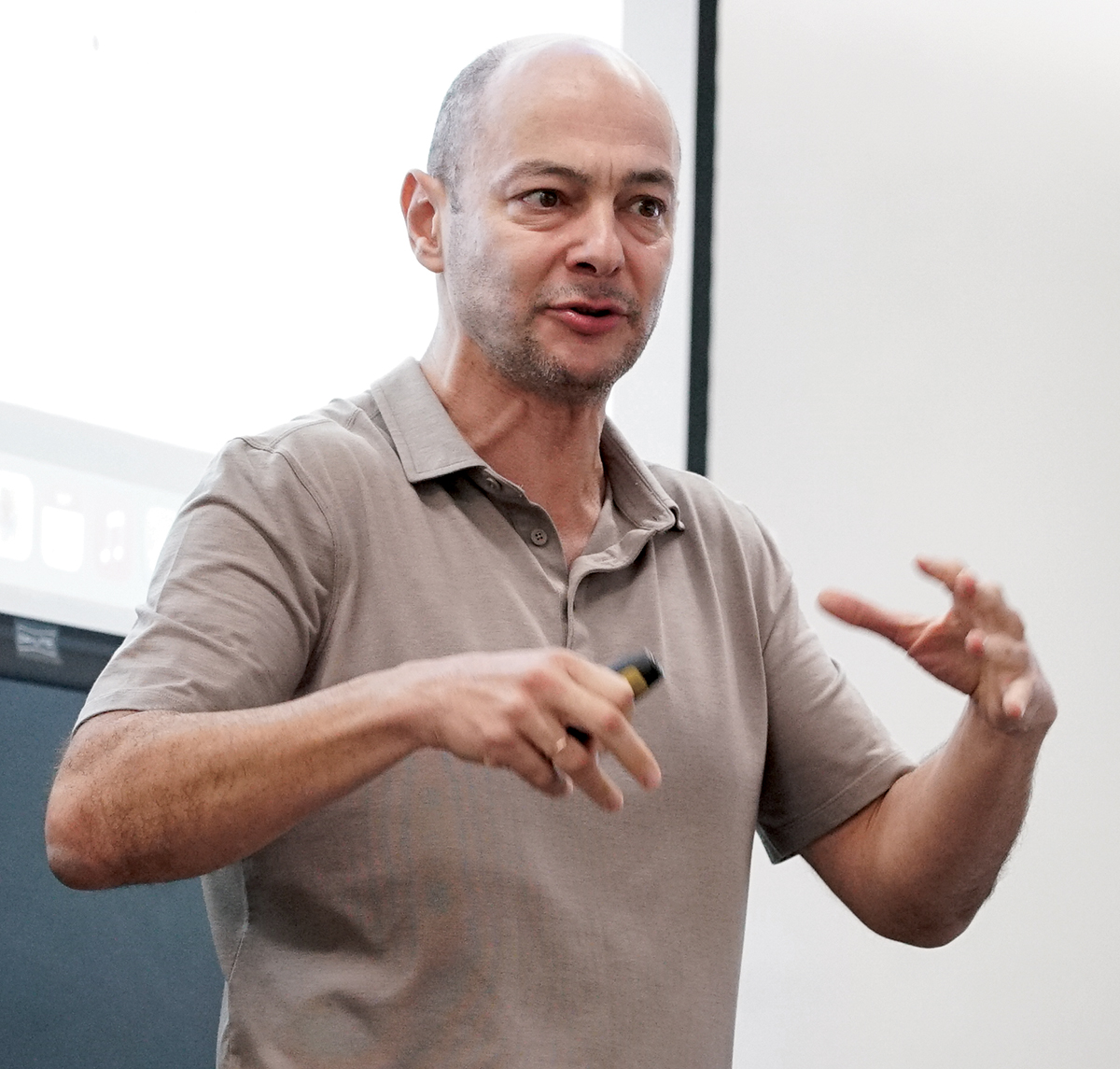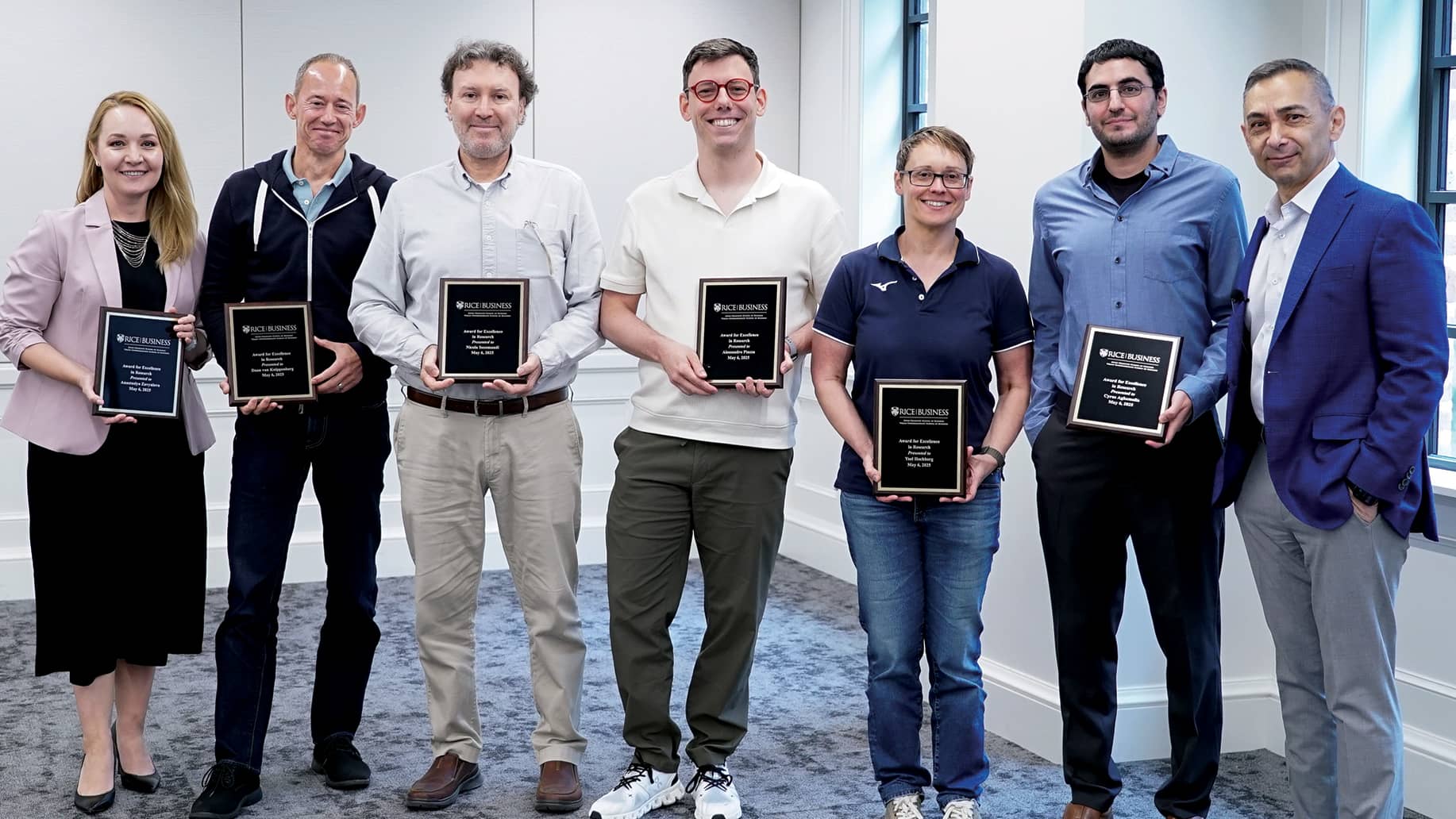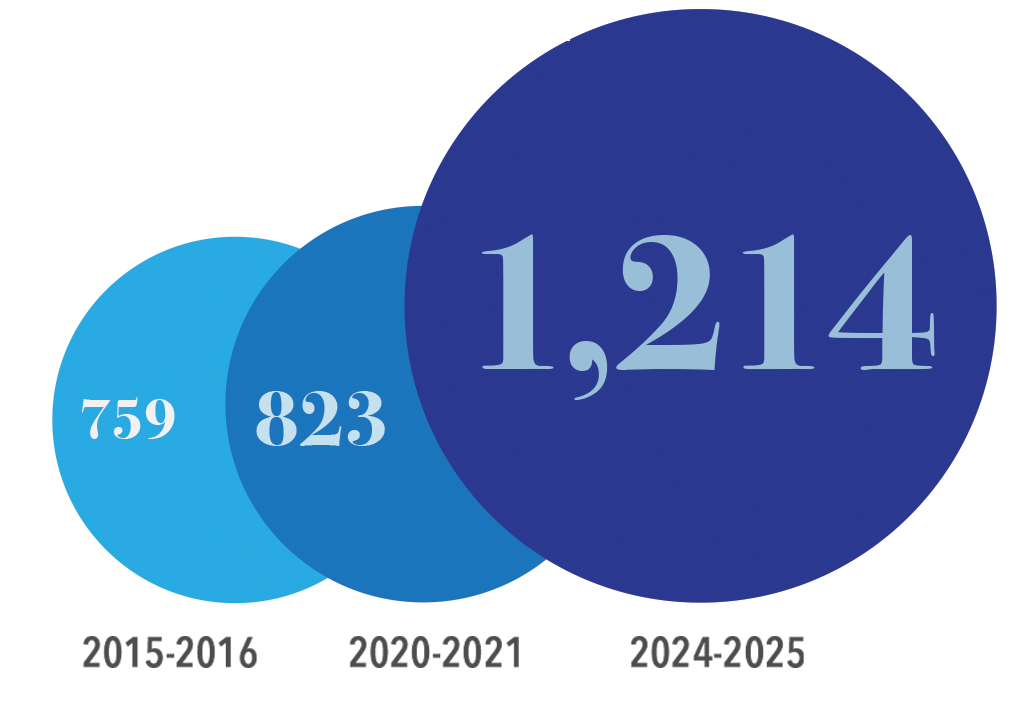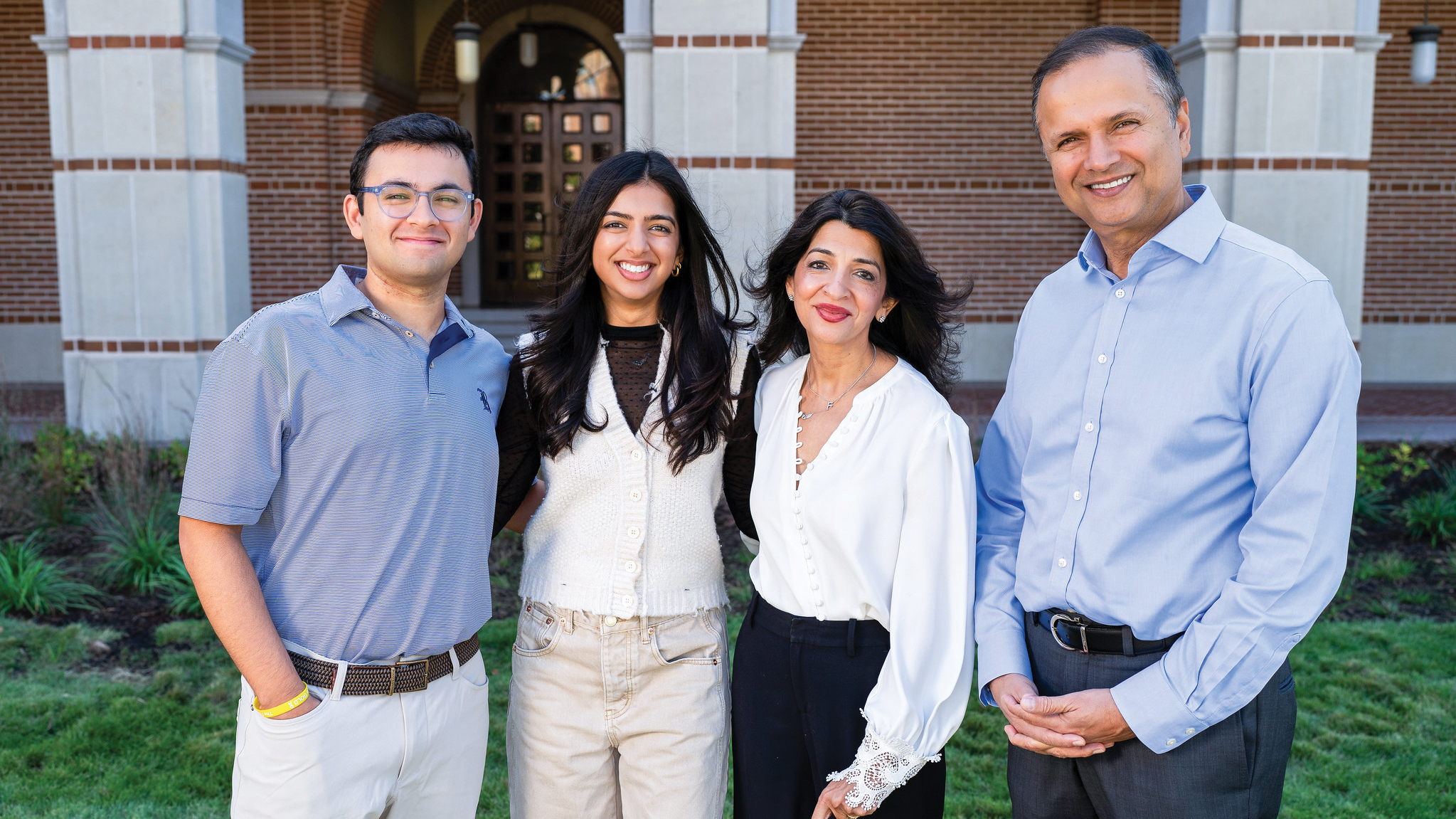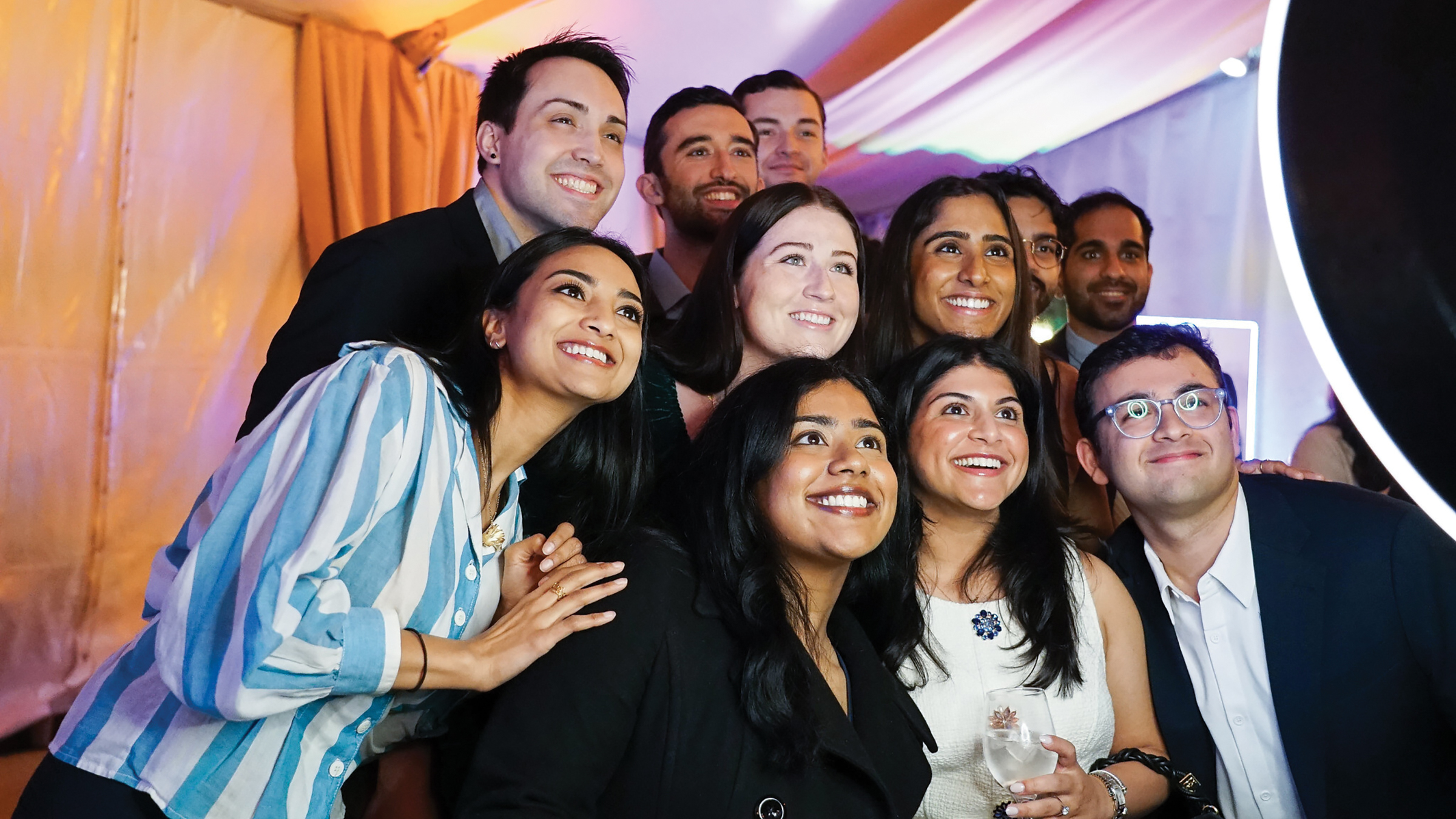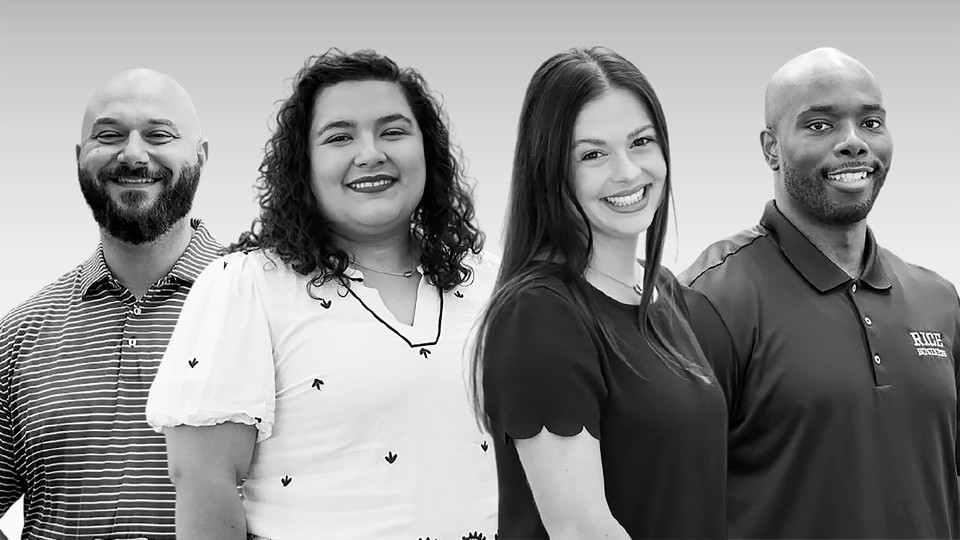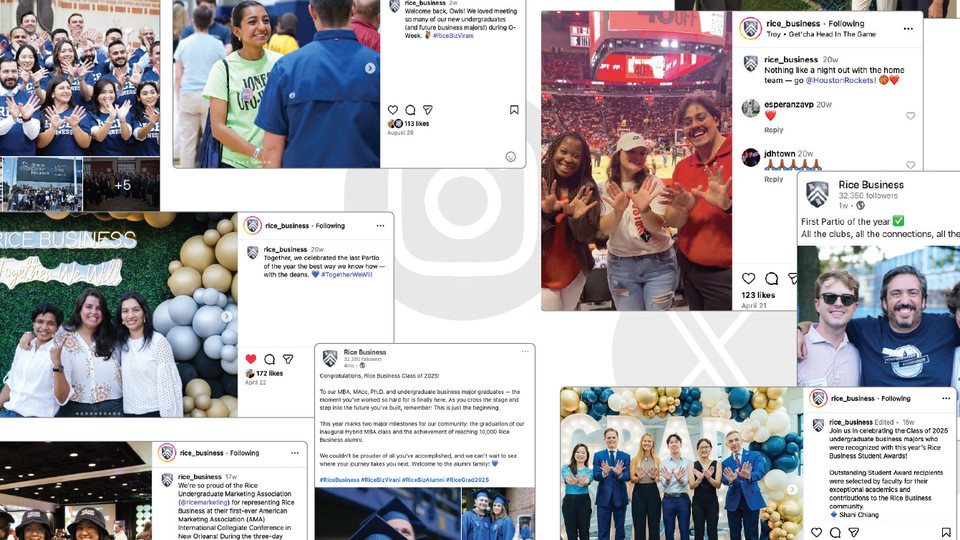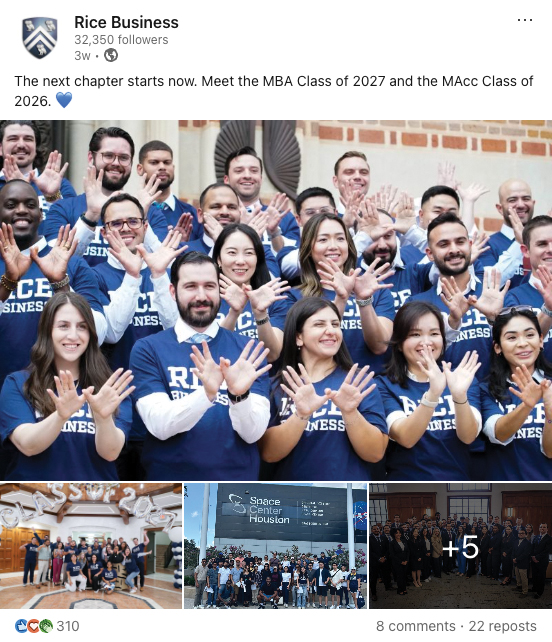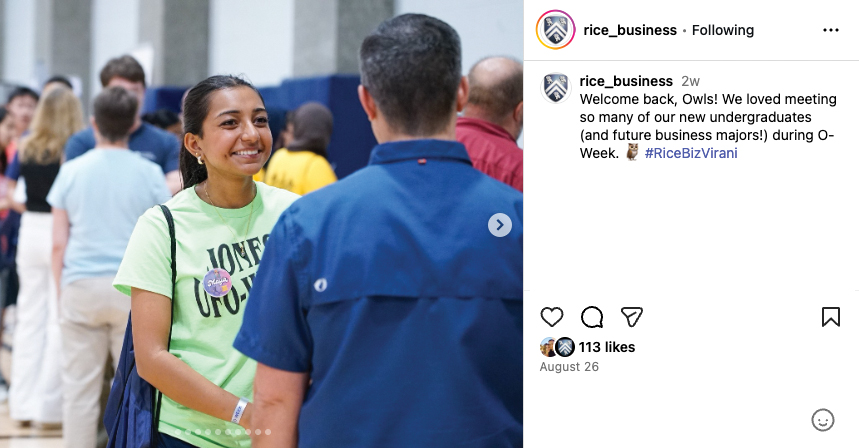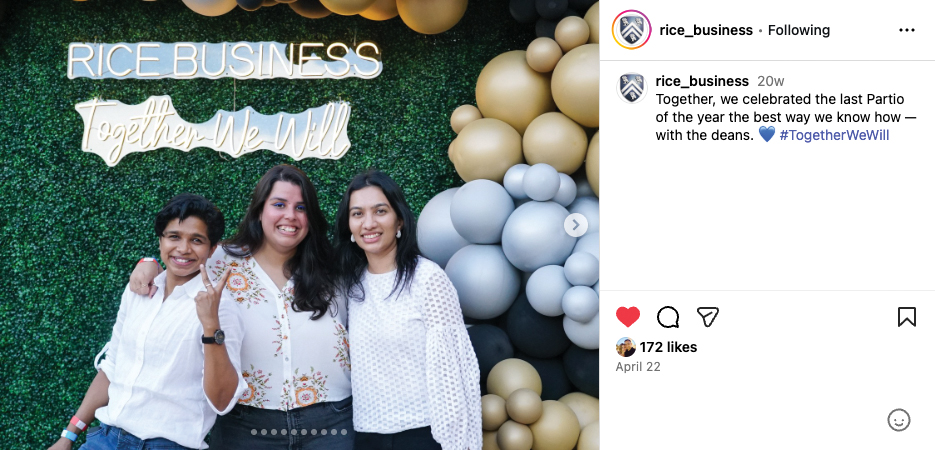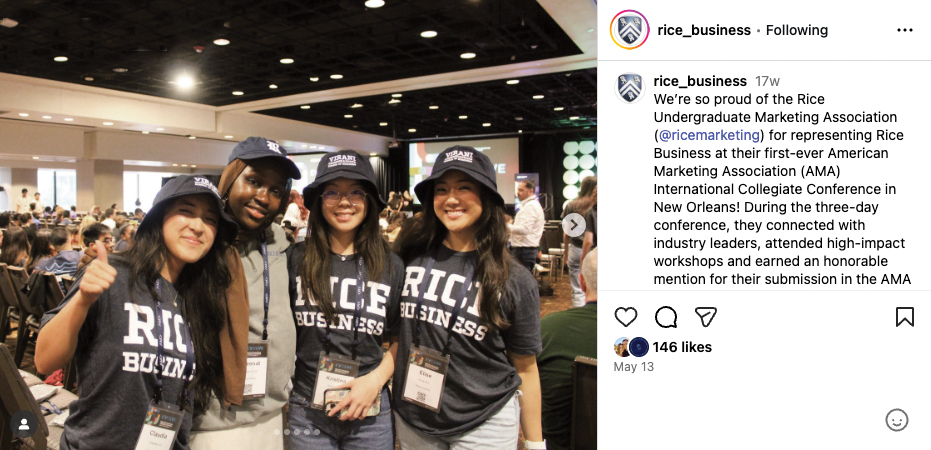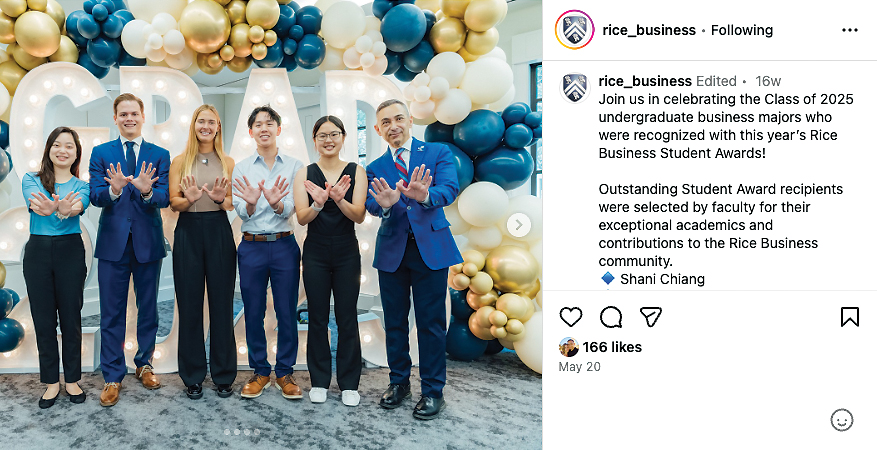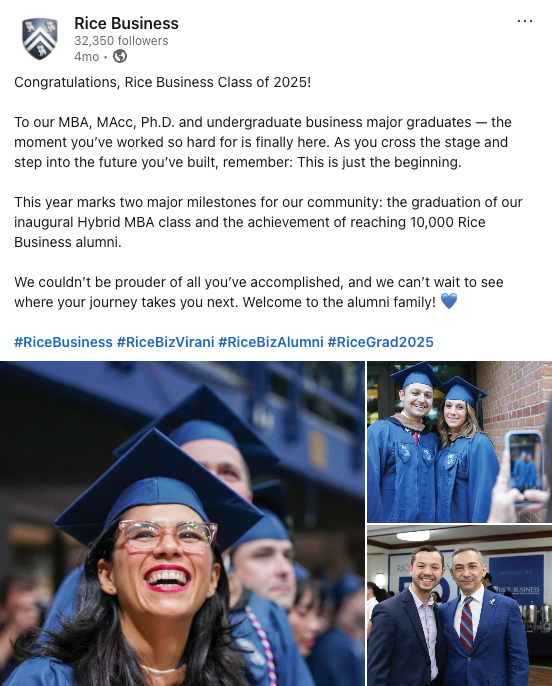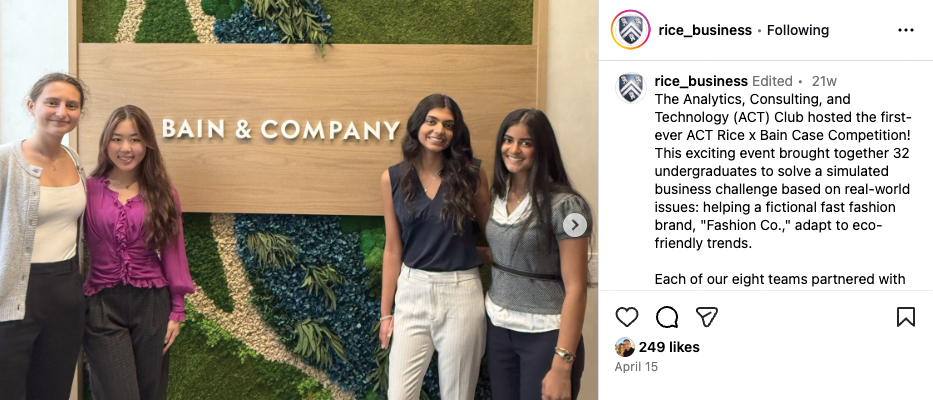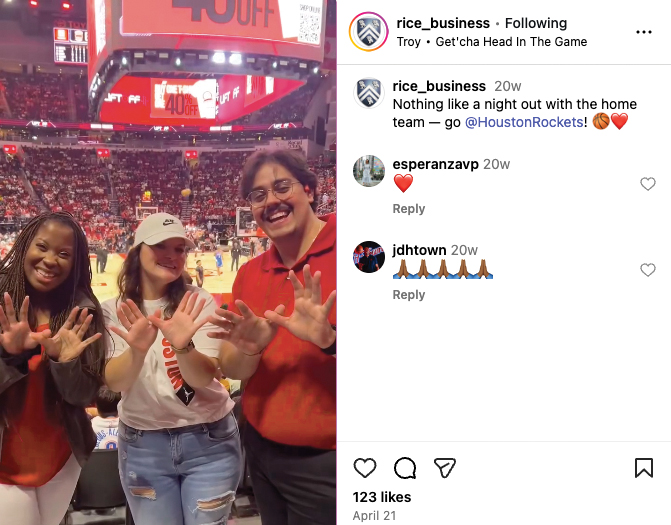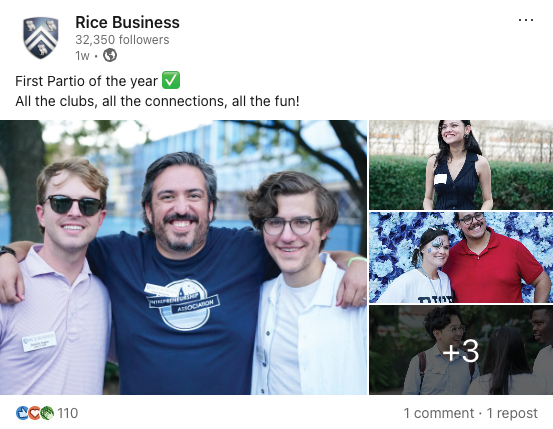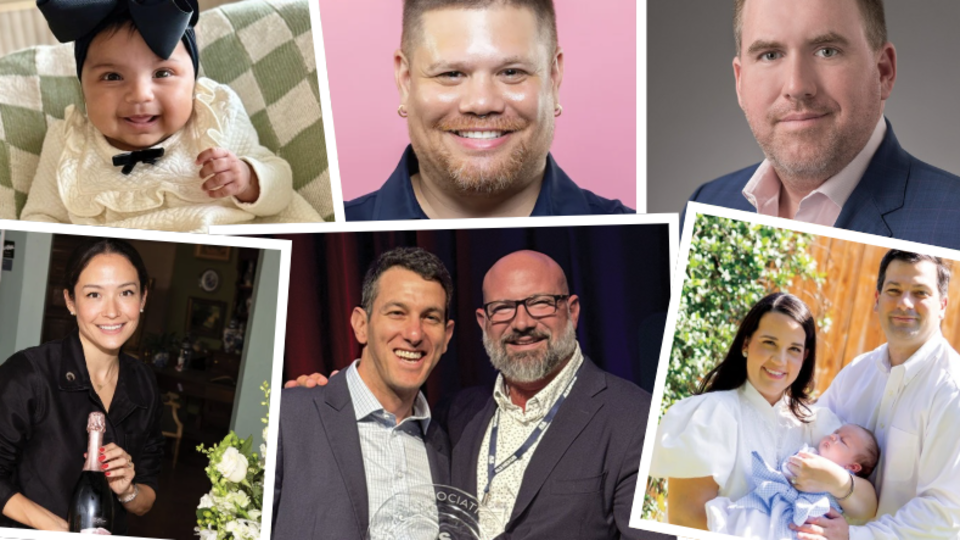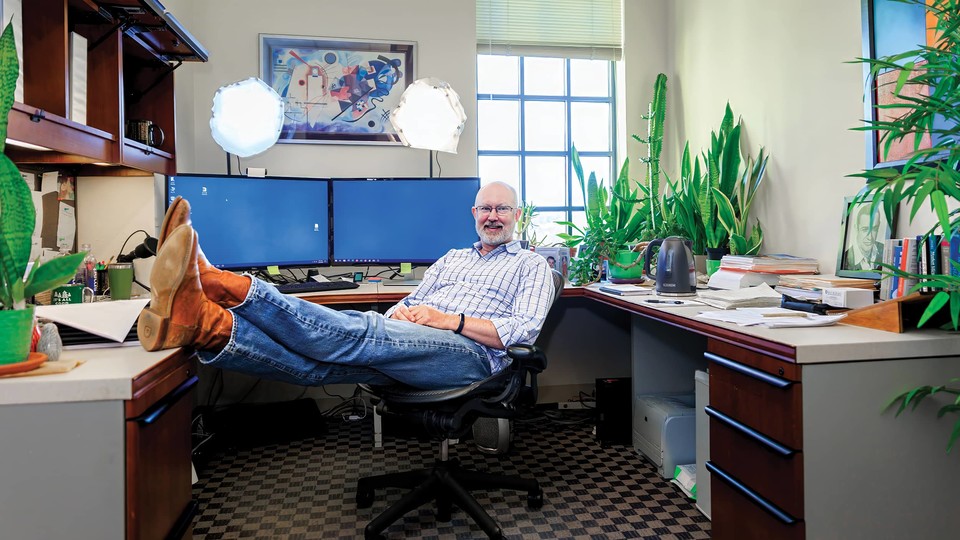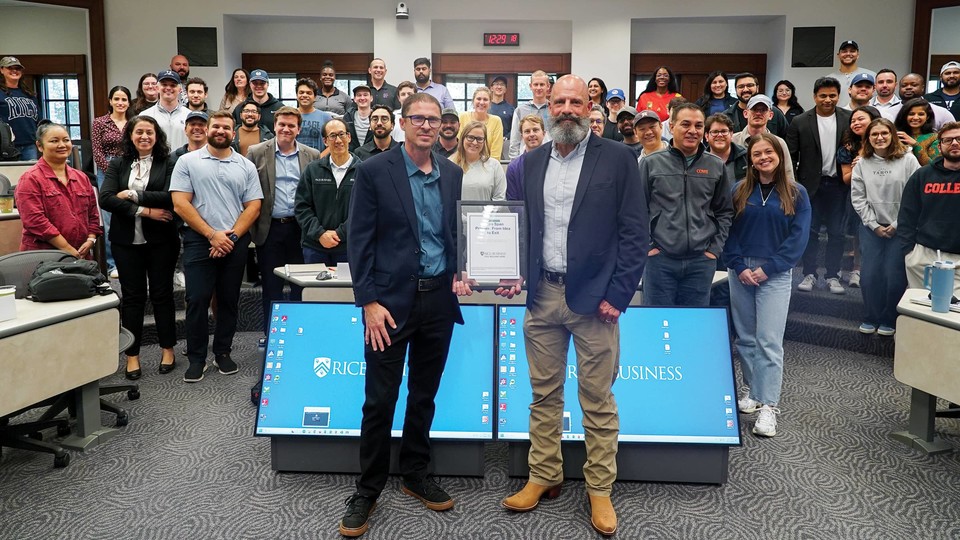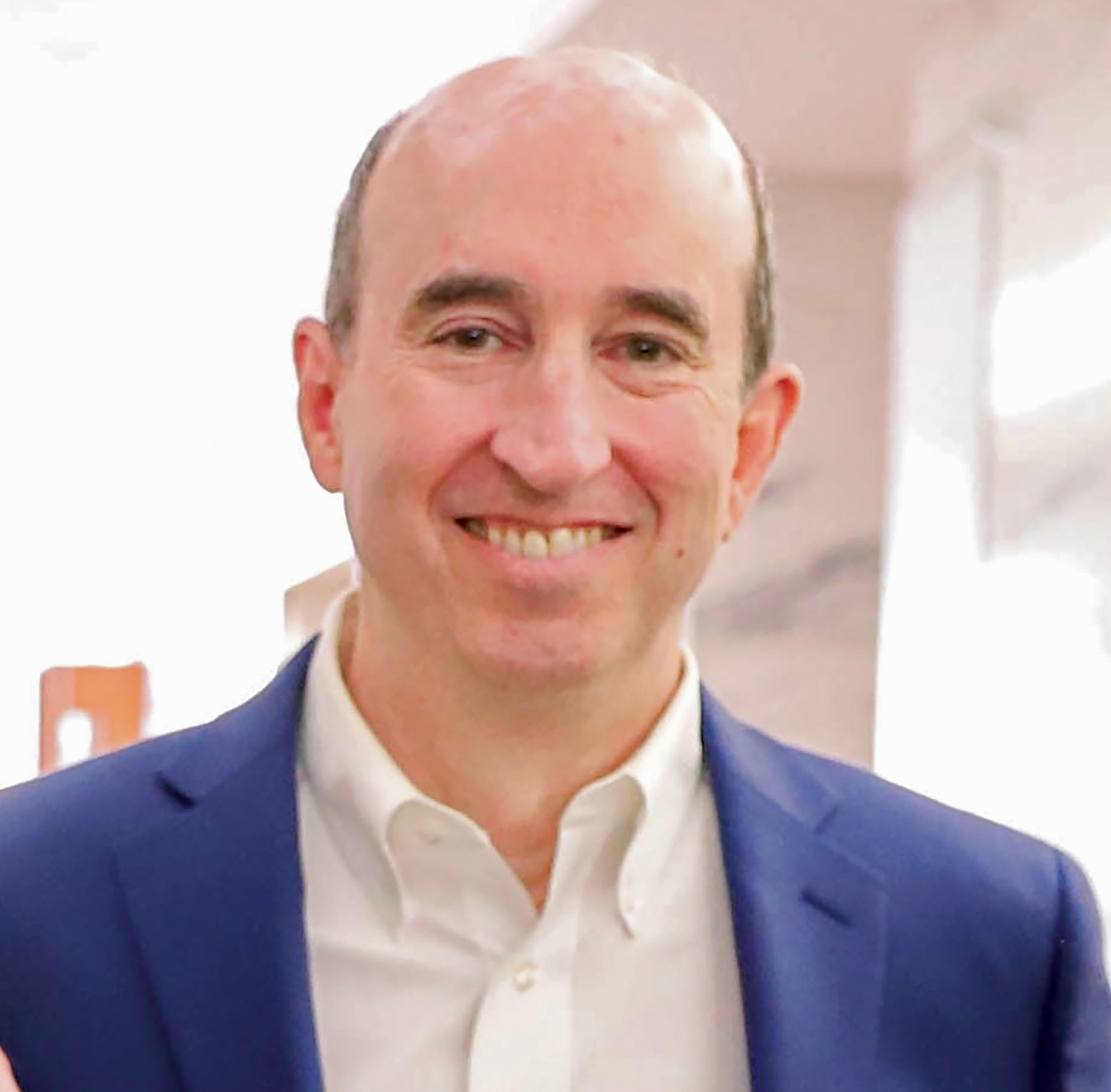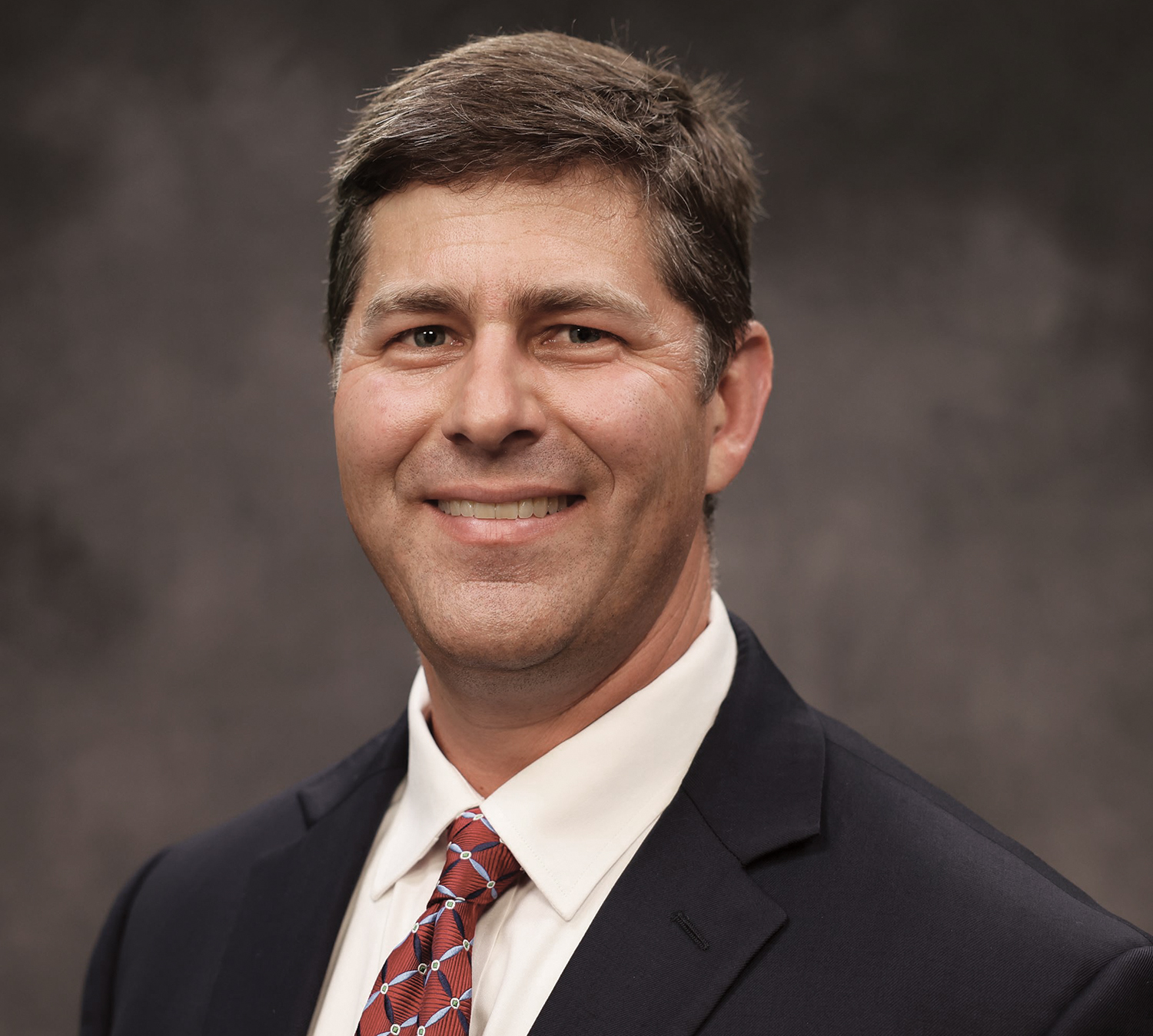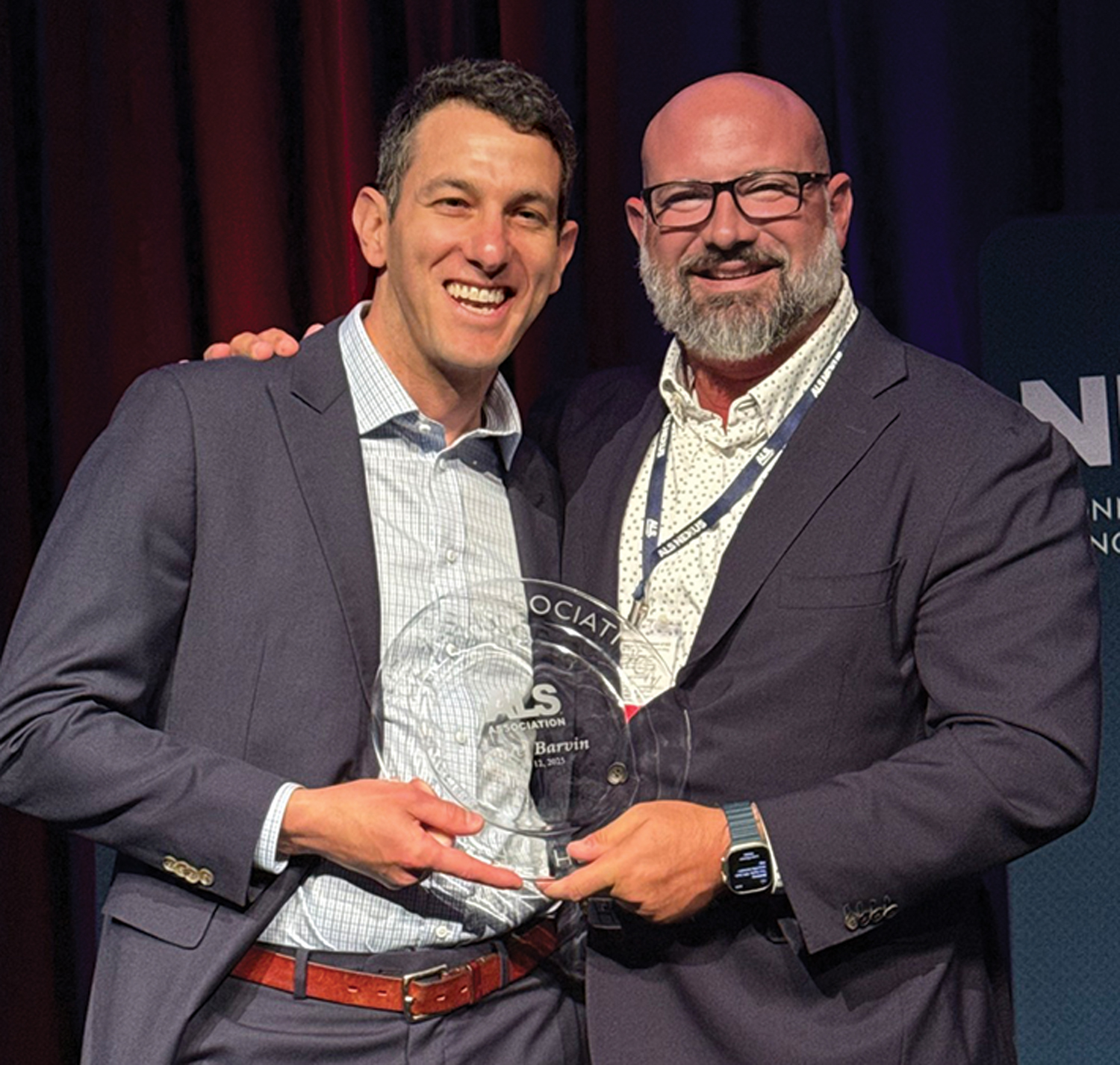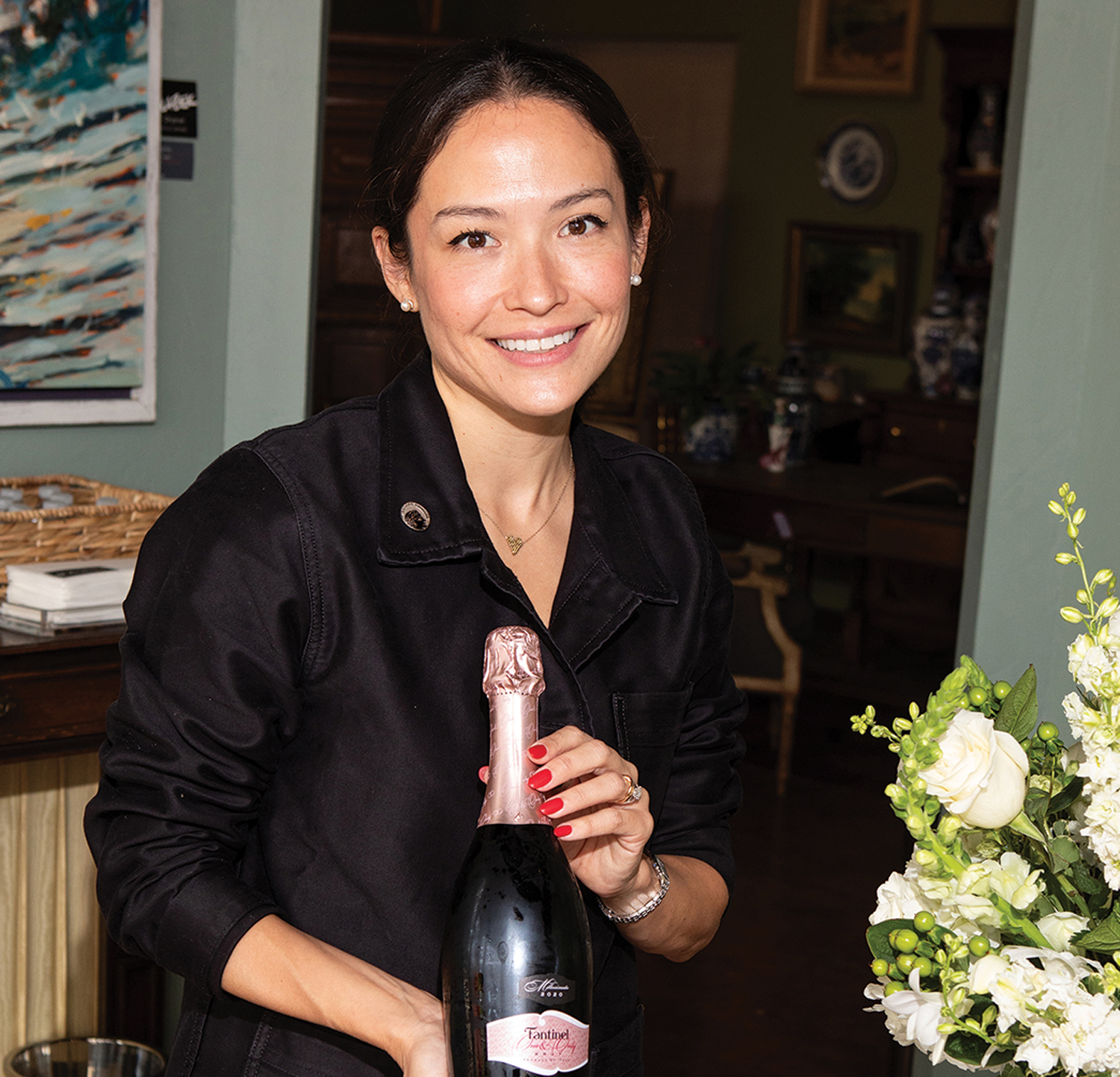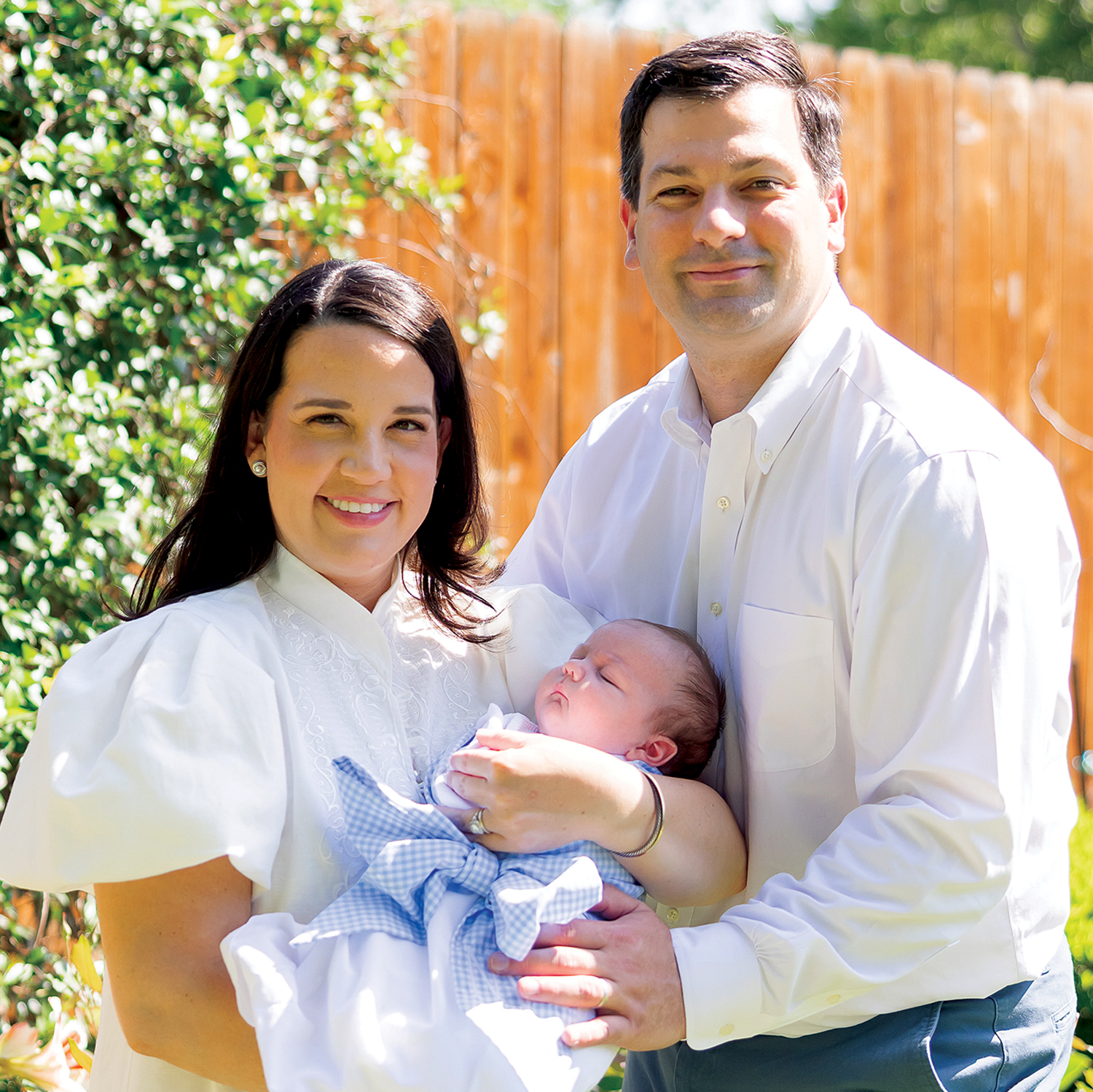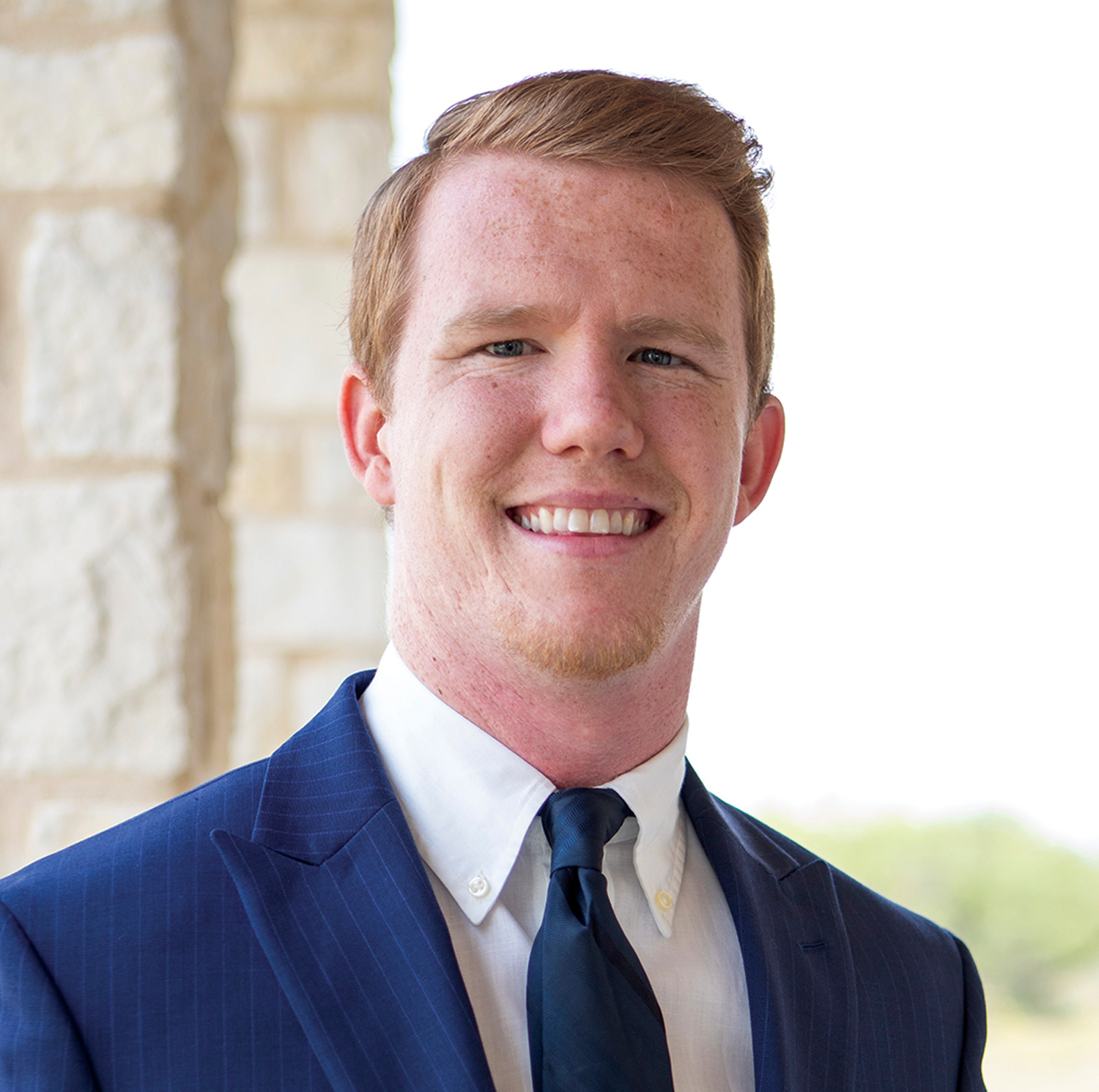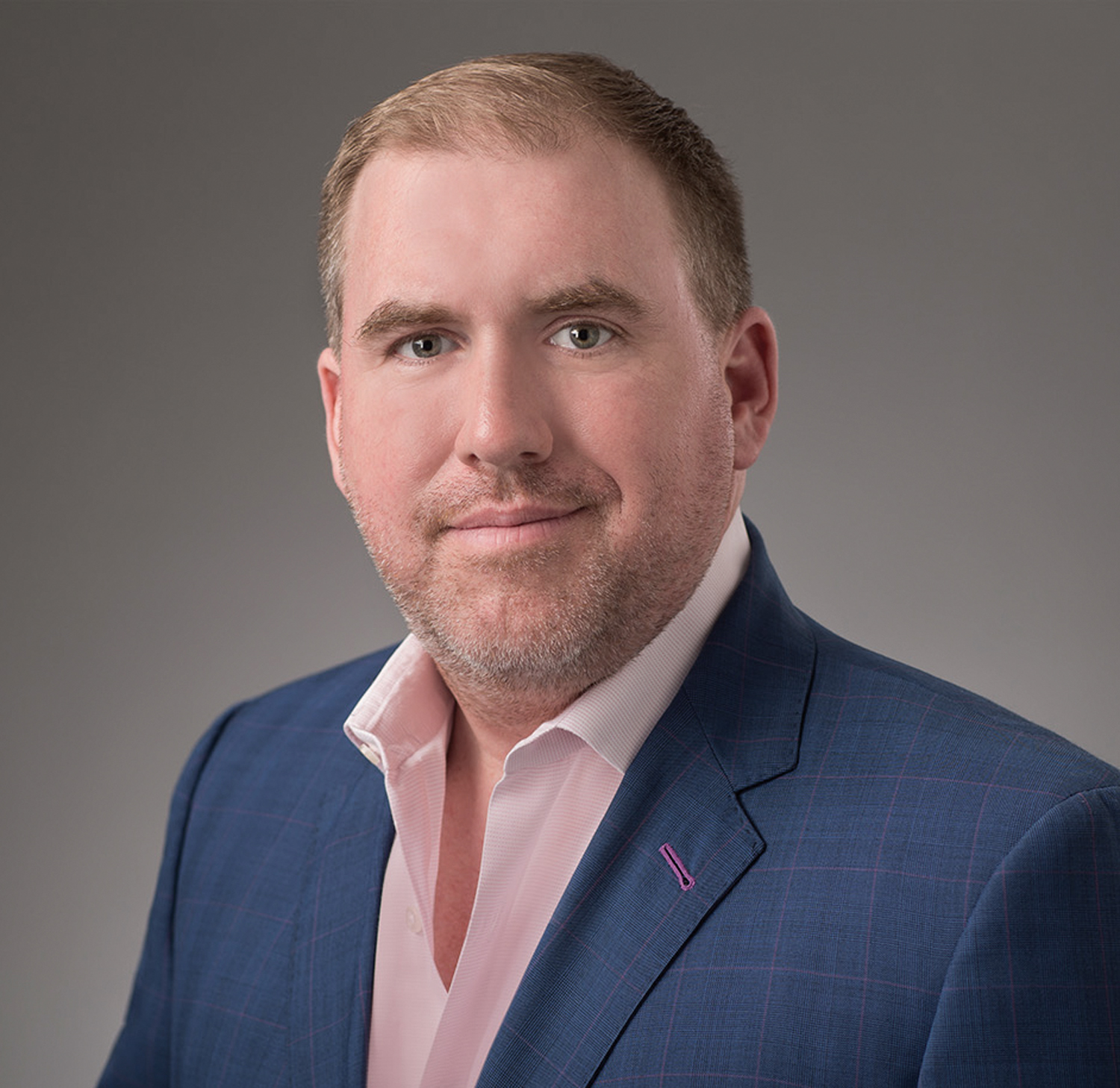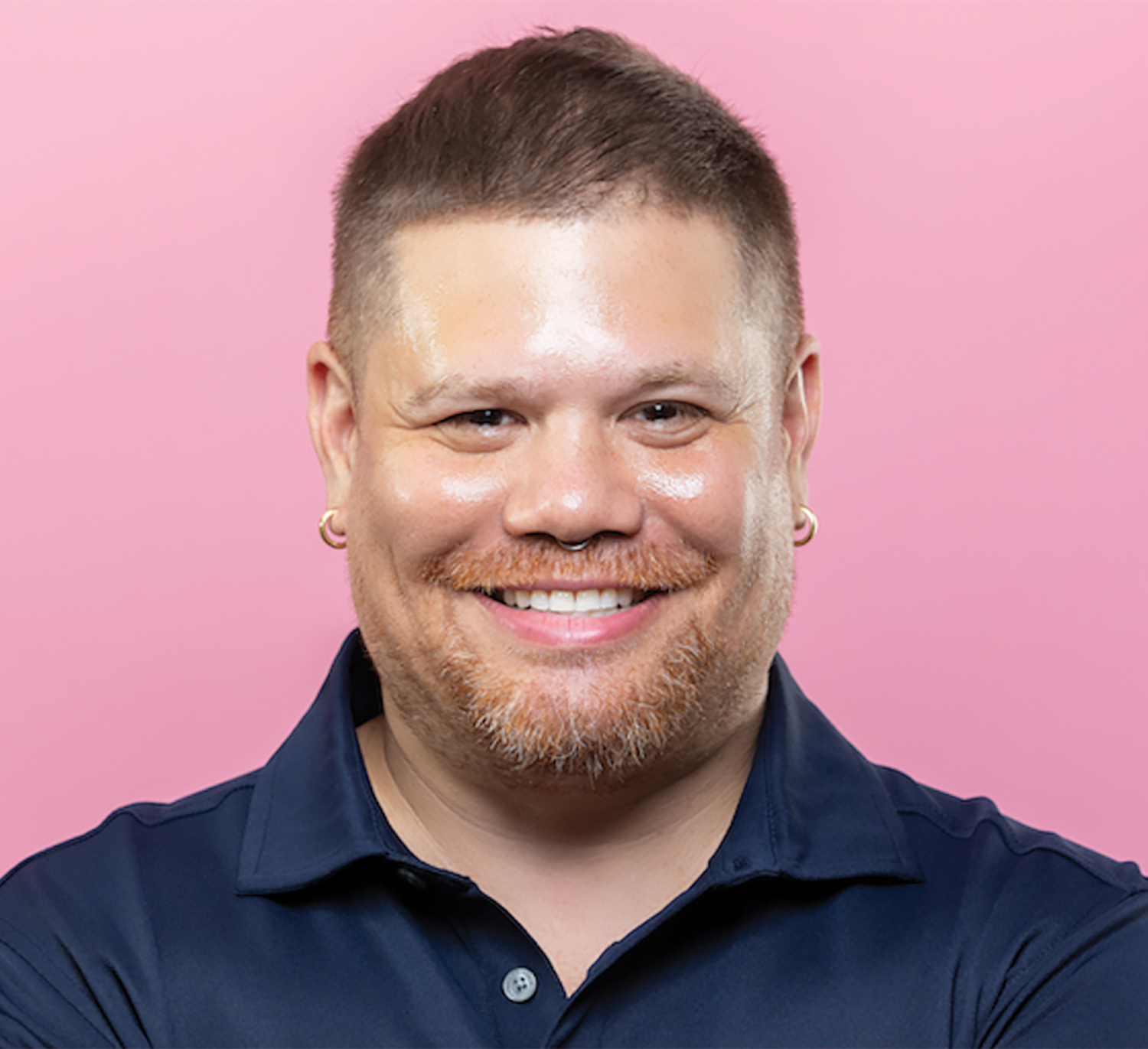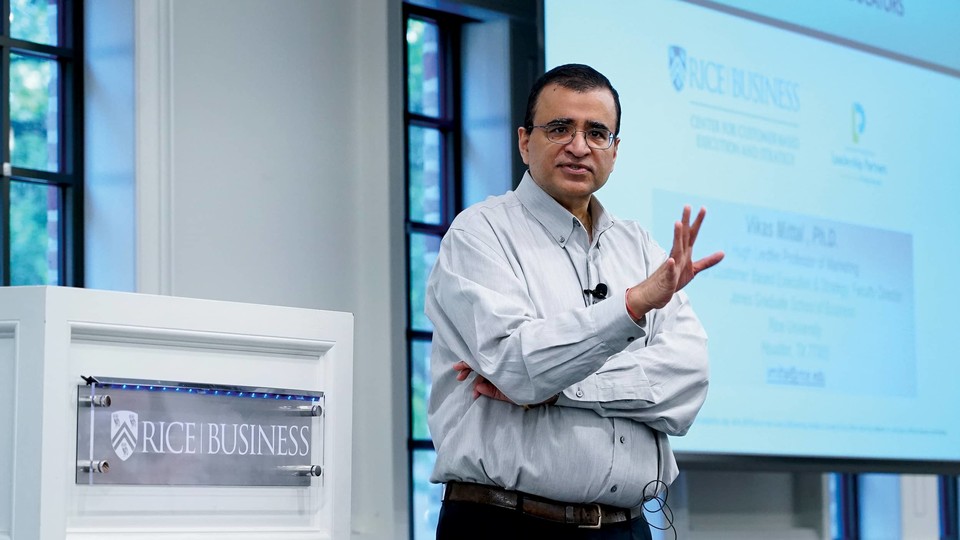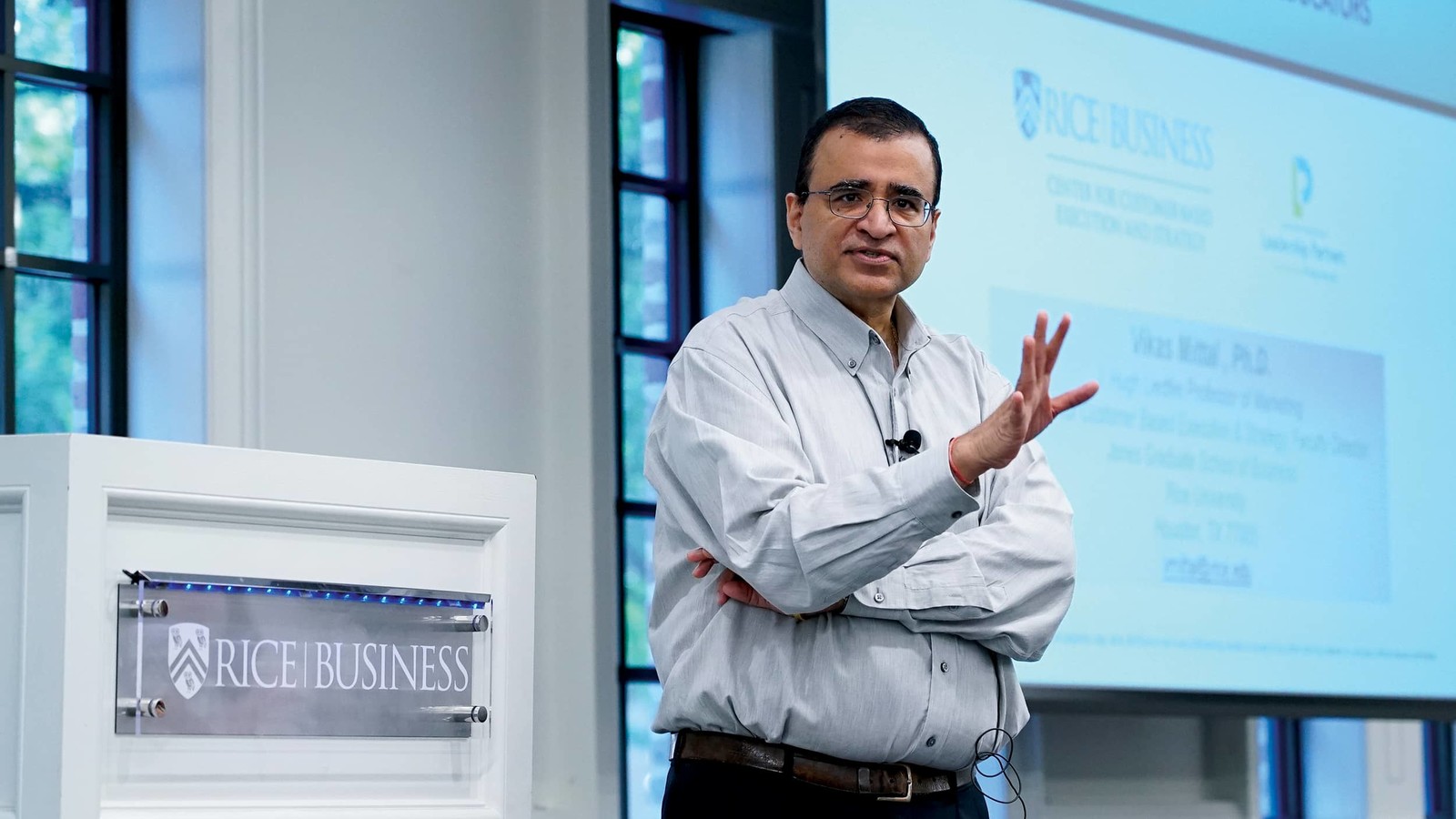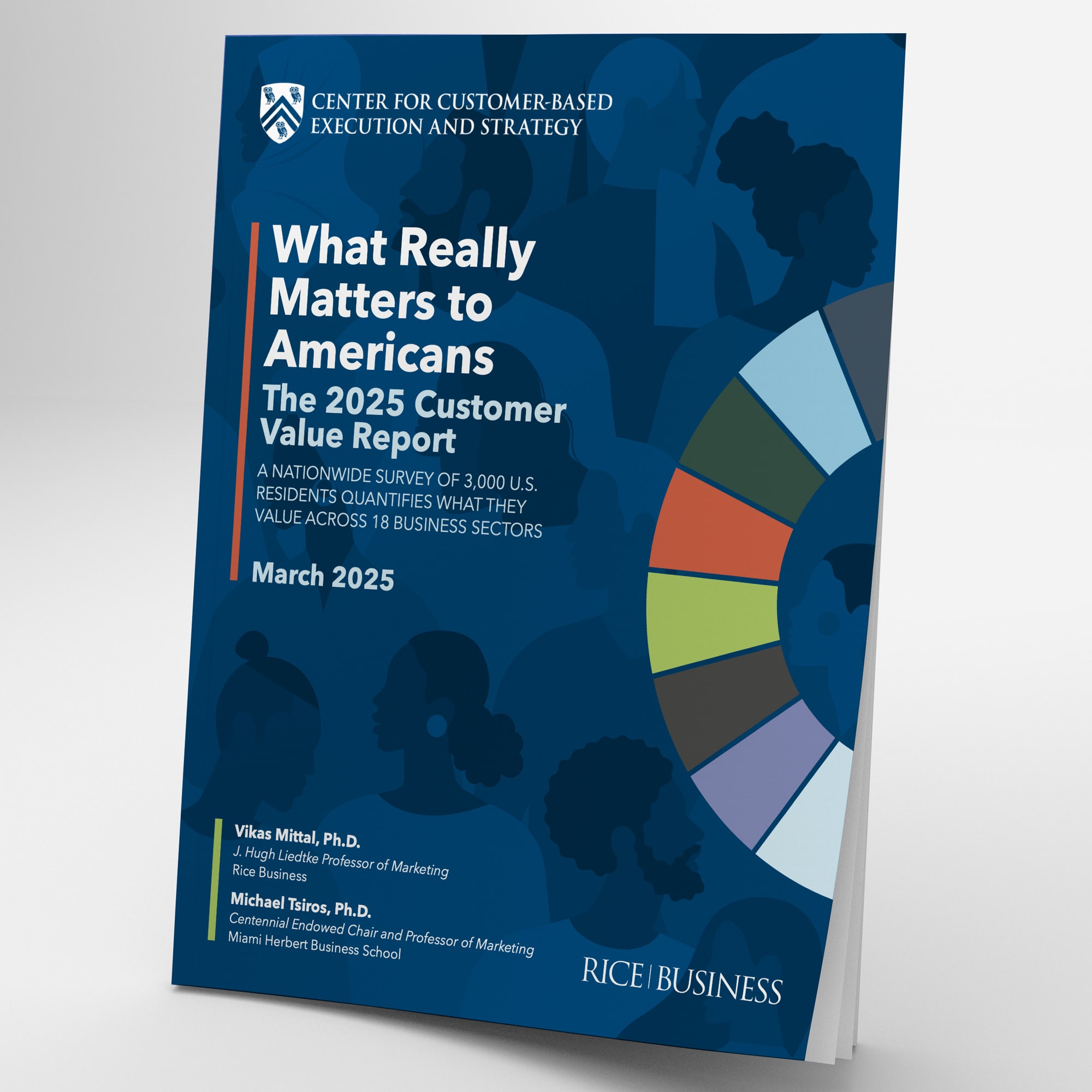[00:00]Maya Pomroy: Welcome to Owl Have You Know, a podcast from Rice Business. This episode is part of our Flight Path series, where guests share their career journeys and the stories of the Rice connections that got them where they are.
From energy to artistry — Marian Villegas proves you don't have to choose between science and art. You can thrive in both. The Rice MBA began her career in petroleum engineering and now leads in the renewable energy space. But when it came time to take a risk and follow a childhood passion, Marian turned to art.
Through her newest venture, Mablueart Studio, she creates bold, vibrant works, weaving together the colors, spirit, and heritage of Texas and Mexico — two places at the heart of her story. With unexpected touches like sand from Marfa and even tequila layered into her canvases, Marian is fearlessly blending worlds, careers, and creativity in ways uniquely her own.
Join us now as she shares how leadership, risk-taking, and imagination can fuel a life without boundaries.
Our guest today on Owl Have You Know is Marian Villegas, Professional MBA from the Class of ’23. Welcome!
[01:21]Marian Villegas: Hi, Maya. Thank you so much for having me.
[01:24]Maya Pomroy: Well, we're thrilled to have you. And congratulations on graduating. I guess it's close to two years ago.
[01:30]Marian Villegas: Two years ago, feels like yesterday.
[01:33]Maya Pomroy: It feels like yesterday, I think, for most. And then you, sort of, stop for a minute and think, “Wow, it's been two years.”
Well, you know, when I was reading your profile, I was just fascinated because you are a petroleum engineer by trade — that's what you went to school for — but you're also this phenomenal Houston-based artist with a studio. And when I was reading about you, I was thinking, “Wow, like, merging the right brain and the left brain? Like, that's really, really unique!”
[02:01]Marian Villegas: Thank you. Yeah, it's been a journey, for sure. And every time that I think about, okay, which side of my brain I like the most, it's, kind of, hard to say, “Okay, this one.” But I try to just mix the two worlds in one.
So, that's the way I have fun, I guess, in my corporate job and also during the weekends when I'm trying to be a full-time artist, but sometimes it's hard. But just mixing these two worlds, it's been so exciting my whole life, to be honest.
[02:31]Maya Pomroy: Well, I really can't wait to jump in and to learn more about your story. So, you're currently a senior asset manager for EDP Renewables in North America. And before that, you served as a petroleum engineer for quite a few companies in Houston and, I believe, in Mexico as well, which is where you're originally from.
[02:49]Marian Villegas: Yes, ma'am. I was born in Veracruz — in Coatzacoalcos, Veracruz. It's a small town in this state, Veracruz, which is next to Tabasco. And then I grew up in Tabasco, which is an oil and gas town. That's why I grew up with the oldest petroleum engineers, this influenced Pemex, the gold era of Pemex. My dad also worked for Pemex his entire life.
So, I had access to all these amazing people always talking about how petroleum engineering work. And I guess, if I need to name that part of my life, I will call it, for sure, when I was extremely curious about everything, curiosity led me to a degree I have now, which is petroleum comes from the University of Guadalajara in Tabasco. I was the second generation to have that petroleum engineering in Tabasco. And I decided to follow that path because Tabasco was huge in oil and gas. So, I had the petroleum engineers as teachers pretty much. It was not a conventional professor. It was pretty much the guys leading in a normal daily basis, teaching us the beauty of engineering, the petroleum engineer.
[04:02]Maya Pomroy: So, your dad is also in oil and gas. Is he a petroleum engineer as well?
[04:06]Marian Villegas: He works in administration. So, he's not an engineer by default, but he was leading all the financials for south of Tabasco, which was one of the most important regions of Mexico. So, south, which is Tabasco and Ciudad del Carmen. These places are extremely well known for shallow waters, production.
[04:33]Maya Pomroy: So, you grew up in this sort of space. Tell me what it was that was fascinating to you. What was that spark for you when you decided, “You know what? This is what I want to do.”
[04:43]Marian Villegas: This is a story that I love to tell everybody because it brings me back to those days, and I miss those days so much. As I mentioned, I grew up in this beautiful town. It's a very small town, Tabasco, Villahermosa, but it's all about oil and gas. Everybody, every single thing is about oil and gas.
So, I always love art, in a way. Always reading art, always painting. I've been painting my whole life in different aspects, but I never thought about that as another source of income, in a way, as a business. So, I just love art because my mom loves art. She will always tell me these amazing stories about art, places around the world. And I will buy books, read about it. I fell in love.
But by then, as I knew I wanted something with design, I was willing to probably do something with architecture. But in high school, I got this great class about architecture and I didn't like it. For me, it was like, “No, this is not for me.” So, I was struggling before I actually decided what to be, what to study. And then one day I told my dad, like, “Hey, dad, okay, who is the most important petroleum engineer in Pemex?” And he's like, “What? Like, well, it depends. We have different regions.” And I'm like, “Well, in our region here in Tabasco, who is the number one? Who is the boss?” And he is like, “Oh, well, okay, this engineer.” I'm like, “Okay, can you get me an appointment?” And he’s like, “This is not something that you just go and get request an appointment. No, this guy is busy.”
So, long story short, I convinced my dad. He called his assistant. I guess this guy was very curious when he heard about it, so he said yes. So, then I got a call. And they were like, “Hey, Marian, you can come visit this engineer. You just have 15 minutes.” I got a huge notebook, you know, with a bunch of questions. So, my dad was like, “Please, Marian. Please, just behave. Don't waste his time. He knows me.” And, you know, I'm like, “Don't worry. I got it. Let me go.”
[06:59]Maya Pomroy: How old were you when you did this?
[07:00]Marian Villegas: I was 17.
[07:01]Maya Pomroy: 17. So, you were a grown kid.
[07:03]Marian Villegas: Yeah. I was not, like, 10 years old. I was 17. Still, very immature. I was just excited. I had no idea about petroleum engineering. I've never heard that before. I had no idea. So, I wanted to have a good understanding of that from a guy who was leading an entire organization.
So, I went there. He was extremely nice. He saw me. He's a very sharp guy. And then the minute he saw me, he was like, “Okay, Marian, I guess those are all your questions. I'm going to just talk about petroleum engineering. You don't need to tell me your questions. I will just tell you my story.” And after an hour and a half, not 15 minutes, an hour and a half of this amazing story, I fell in love with the idea of being a petroleum engineer. He talked about, “This is art.” You know, the words, the way he was explaining that to me like a story, for me, that was a, yes, I want something that I can feel that passionate about, for me, is also art in a way. Like, “Wait, how do you drill a well? And you’re telling me that you cannot see it but you know where to go?” And, you know, for me, it was like, “This is art.”
[08:20]Maya Pomroy: Yeah.
[08:21]Marian Villegas: I do remember the only question I asked him was… well, I asked a lot of questions, but the main one that he was shocked… And until today, I can say that he's my friend. I kept that guy as an engineer and mentor my full career. I asked him, “What is the difference in between you sitting behind that chair and all the petroleum engineers that are way behind you, like, are here listening to you, waiting for you, waiting for your leadership? So, how can I be in that chair? What do I need to do to be leading a team one day? To be that person that people will follow for good decisions as an example? I want to be like you.”
And that led us to that amazing conversation. And he taught me all that I know about leadership, in a way. Of course, I also wanted to keep learning. That's why I wanted an MBA. My knowledge was so limited into the general engineering standard. So, I wanted to think, okay, what are the decisions a CEO can make? And the MBA, it's the tool for you to learn that.
[09:35]Maya Pomroy: So, at 17, you already knew. You were like, “Okay, so, this is the industry in the field I'm fascinated by.” And kudos to what a phenomenal leader he is to have explained it to you and to really be able to explain it as an art, as an art form. So, what brought you to the United States?
[09:51]Marian Villegas: Yeah. So, I was in Villahermosa. And then this company, Petrofac, came to the state. And I got a job — well, half job. I was just doing a program through my university. I was not fully working, I was learning. So, I would go there half day before going to school.
[10:12]Maya Pomroy: So, like an internship.
[10:15]Marian Villegas: Like an internship. Yes, an internship. I was there for two years. And during these two years, I met an amazing person that is my friend now. And she was the one that told me, like, “Hey, Marian, you should come to Houston.” She's from Houston and also from Villahermosa. She has these two worlds.
And I'm an only child, so I never actually thought about, “Oh, well, yeah, I could potentially live in a different country.” Never. So, she was the one that put that little idea in my head. And then, through time, when I was talking with so many people in this company, I had people from all over the world working there, that gave me the idea of, “Oh, wow, this is actually something that I can look into it.”
And all the managers that I had, they were extremely excited about everything related to me and seeing me grow in my career. So, they were the ones also telling me, “Marian, yes, keep learning English. Keep being that curious person. You should try. You should look into another opportunity out of town.”
[11:25]Maya Pomroy: So, when did you come to Houston?
[11:27]Marian Villegas: I came to Houston in 2017. And I came to Houston first to visit my friend. She moved to Houston, and then she invited me to see the town, to be with her, be around, get to know the city. So, when I came here, I was like, “Wow!” And this is me coming from a very small town into this massive town that is Houston. I was like, “Wow! Yes, I want to be here. Yes.” And she introduced me to a lot of people. And from all these people, I met this amazing engineer that became, with time, my friend and also my boss. And he was the one giving me the first opportunity to work here in the U.S.
[12:12]Maya Pomroy: And which company was that with?
[12:13]Marian Villegas: This was Sigma Cubed. Sigma Cubed was mainly driven by data and mainly driven by fracking design. So, as a petroleum engineer, I knew a little, but my expertise was in production. That was a different field for me to learn. But the key, the thing that opened the door for me was that I was coming from Tabasco, and Tabasco by then was also booming in oil and gas. And as I'm coming from Pemex, too, the very first door was, “Marian, you know all these people, you know all these engineers in Mexico.”
[12:48]Maya Pomroy: It’s all about who you know, yeah.
[12:51]Marian Villegas: And then I was able to help a little, you know, and give some direction, “We can go here. We can go there.” So, I had access to these offices in Pemex, in Tabasco, in Mexico City, in Reynosa, all the different regions.
So, that was my very first experience. He trained me with the team in U.S. here in Houston. I started traveling a lot. I had my very first job hired in U.S. into Poza Rica, which is a different city, another city in Veracruz, in Mexico. And this is mostly, used to be, mostly driven by fracking design as well. So, I learned a lot about fracking design. And it was me connecting these two countries to develop and drill wealth.
[13:43]Maya Pomroy: So, you said design, right? So, design is artistic as well, just like drilling wells and then fracking design. And I see, sort of, the common thread. When did you decide you wanted to be an artist? I mean, because you grew up with art, as you mentioned, and your mother was fascinated by art. Like, when did it make that transition where you're like, “You know what? I love petroleum engineering, but I want to be an artist?”
[14:05]Marian Villegas: Yeah. So, when I moved to Houston, it was a little bit scary, but I always loved that type of scary. I'm the type of person that will always tell you, “If this is scary, keep doing it. Like, do it. Something great is going to come out from that.” I don't like to stay in my comfort zone.
[14:25]Maya Pomroy: I love it.
[14:25]Marian Villegas: In 2017, I had no friends. This was a different country. It was even my very first time leaving home, different language. Everything was new.
[14:36]Maya Pomroy: And exciting!
[14:37]Marian Villegas: I was very excited back then. I was like, “Yeah, I can’t wait to keep exploring, keep knowing people. I can’t wait to see what Houston will bring for me.” So, I was working and then nothing else. So, in this free time, I went for the very first time to Texas Art Supply.
[14:56]Maya Pomroy: Oh, we're over here off of Voss and, like, Texas Art Supply.
[15:01]Marian Villegas: Yeah, the Voss. The Voss one.
[15:03]Maya Pomroy: Yes, I know. It's around the corner. And my children love art and I think I've spent, like, their entire college education fund at Texas Art Supply. I know exactly where that is. It's locally owned. It's been there for forever.
[15:17]Marian Villegas: Yes. In that store, as you can tell, it's just amazing. I remember me spending the entire weekend there and spending all my money. And when I'm telling you all my money-
[15:29]Maya Pomroy: Same.
[15:29]Marian Villegas: … it was all my money. My very first paycheck — I remember this and it was so funny — I ran out of money and I called my dad. “Dad, I need your help.” And he was like, “I can't believe you are spending all your money in art. Like, no, Marian, you need to learn. If you decided to leave the country, you're going to learn to live by yourself.”
[15:52]Maya Pomroy: And how to budget.
[15:52]Marian Villegas: “Do your finance.” Yeah, everything. And that was a tough lesson because, of course, I was like, “Okay, what am I supposed to eat?” But well, I made it. And then I started selling art. I draw little things and then I saw… I start selling that to my neighbors in my building. I'm a very visual person, so they will be like, “Hey, Marian, can you draw this? I saw this amazing piece of art from another artist, but can you just tweak it? I want something similar.” So, I started doing that. Like, “Yeah, I mean, I cannot do that exactly like the artist. That's not right. But I can do my version of it, if you like this idea.”
[16:30]Maya Pomroy: How much did you sell them for?
[16:31]Marian Villegas: Seriously, like, 100 bucks, 200 bucks. So, I started doing that and I just started playing. And that's what I did all these years in between my job and art until this year. This year, I decided to go big and, for the very first time, to get my art studio because I was a little bit scared to do it in a way of, man, I have my full-time job, which is pretty demanding, and also an art studio leads to deliverables. And you have now a second business.
[17:08]Maya Pomroy: You know, what I found is when you're having the most fun and it's not work, when you can find that, then you found gold, you know. When it doesn't feel like work, then you found your true passion and what it is that you're destined to do on this planet.
[17:25]Marian Villegas: Oh, yeah. And until today, like, it used to be my therapy, in a way. I will work the entire week. And during the weekends, I will paint full time. And for me, that was my escape. Today is also business. I have deliverables, I have people waiting.
And my biggest fear was that, like, at some point, I would just stop enjoying this part of the art world because I needed to deliver. So, that's why I guess it took me so long to decide to make it big, as I didn't want to see this as another job. I wanted to keep painting and seeing this as my therapy. And art is always for me the answer. But yeah, I didn't want that to take away that creativity from me.
And as of today, this part is here still. I'm so excited painting every weekend. I work from Monday to Friday in this new world, in the renewables world. And during the weekends, I'm a full-time artist. I'm all over the place. I decided this year to go hard in Western. I've been loving it. I've been meeting a bunch of people. We are in Texas. Texas is huge in rodeo. Texas is huge in cowboy style and Western fashion and all this amazing western surroundings, and I'm just loving it.
[18:57]Maya Pomroy: And when was it that you started exploring graduate school programs, and specifically, MBA programs?
[19:02]Marian Villegas: It was during the pandemic. 2020, that was a pretty rough year. And I was very limited in my knowledge as an engineer. I couldn't move forward. I couldn’t understand, in a way, how the business worked in a high level. I was just designing wells, but I wanted to know, okay, what else? What is out there? So, the very first week, when I came to Houston, I visited Rice University.
[19:34]Maya Pomroy: The first week?
[19:34]Marian Villegas: I just walked around. The very first week.
[19:36]Maya Pomroy: Wow!
[19:37]Marian Villegas: Some friends told me, like, “Oh, you need to go. Rice University is the best university in Texas.”
[19:43]Maya Pomroy: I agree.
[19:44]Marian Villegas: Yeah, 100%. And I went there and, oh, my god, that university was art to me, still, till today. And I always thought, “Oh, wow. I don't know how, again, but I really want to go to Rice.” And I was like, okay, I need a few years to understand how the industry works here in the U.S. I need to learn. I need to be more mature. I need to get better in my English. I need to understand better how the business works here, so I can get a better understanding if I really want this.
So, in 2020, I don't know. One day, I just woke up and I applied. And then I went through all the process. And after a few months, you know, submitting documentation and getting all these interviews. I got, like, seven interviews. It was, like, a long process.
Honestly, I thought, “I'm not going to make it. This is extremely hard. They were asking me extremely hard questions.” And a few months later, I got a different job. I got my very first huge, let's say, deal in my job. And the next week I got this call saying, “Marian, you got accepted to Rice University MBA. We're going to send you the letter,” or, “It's in your mail.” And I was speechless.
[21:06]Maya Pomroy: You did it.
[21:06]Marian Villegas: Like, “Oh, my god. Okay.” And then I remember I sat there for a second and I started crying a little of, you know, happiness, like, “Oh, my god, I made it.”
And I was so excited. Then the very first day came and I met a lot of amazing people that are still my friends today. And the MBA experience was the best experience ever. It was extremely hard, as I always have to say. Yes, it's very hard. You need to be extremely committed, to be there, to be present, to study.
[21:45]Maya Pomroy: Time management. But, you know, what I tell my children is that, if it was easy, everybody would do it, you know.
[21:51]Marian Villegas: That’s true.
[21:51]Maya Pomroy: And the hard things are the ones that, you know, those are the fruits of your labor. The hard things are the things that matter the most.
[21:58]Marian Villegas: Yeah. And after two years in that amazing program, I, of course, feel different. I see everything different, with a better approach. Rice University gave me a family as well. Rice University gave me a lot of expertise in areas that I didn't know existed.
[22:16]Maya Pomroy: Yeah. It also gave you the opportunity and the confidence to start your own business and become an entrepreneur, on top of being a petroleum engineer. It was there that, you know, you learn that you can really be an entrepreneur and go after this other opportunity that really spoke to you, and becoming a full-time artist.
[22:37]Marian Villegas: Yes. Having a full-time job during the Professional MBA was extremely hard. I have this full-time job and going to school after, you know, from 6:00 PM to 9:30 PM Mondays, Wednesdays, Fridays. Also, be in school during the weekends, working, exams, test, nonstop for two years. I guess, it also gave me that confidence after I learned how to manage my time that I was able after graduation to keep filling, in a way, my free time in something meaningful to me, something that I could share in something that I could also create as a business.
So, my MBA gave me that mentality as, “Okay, now, here are the tools. You know you can do it. You know you can manage your time because everything is about managing your time.”
[23:30]Maya Pomroy: Yeah.
[23:30]Marian Villegas: Then, let's prepare a little business plan and see, where do you want to be after graduation, if you can make it? And where do you need to be in five years? Where do you want to be in 10 years? And that's what I did.
[23:43]Maya Pomroy: So, for your studio, which is called Mablueart, right?
[23:46]Marian Villegas: Yes.
[23:46]Maya Pomroy: So, did that business plan originate at Rice?
[23:50]Marian Villegas: In a way, Mablueart always existed. And that was just the name that I chose. Nothing crazy. Mablueart means “Ma,” as my name, “blue,” because I'm obsessed with color blue, I have to confess. That's my very favorite color.
[24:07]Maya Pomroy: Favorite color.
[24:09]Marian Villegas: And everything is blue. The brand is blue. Everything is blue to me. And “art,” Mablueart. So, I started that when I was in Villahermosa, still, but never actually thought about that as a business.
So, when I graduated, during my MBA, I started selling art to my friends, too. And they will commission some pieces and they were like, “Marian, you can do it. Just, you need to believe in yourself. You can make it.” So, during my MBA, I had the idea. I started developing the idea, but I had no time to paint because full-time, work, full-time job, and school was pretty hard.
So, as soon as I graduated, I knew I wanted to take the art business into another layer. Probably not exponentially, you know, but step by step, and see what else. So, that's when I started painting more. We went to Marfa in 2022. My god, that's when I knew, “Okay, it needs to be Western.”
What a beautiful town — Marfa, Terlingua — amazing. I start sketching. I start drawing horses and hats and all this Western vibe. And with time, I started doing more horses and more cowboys. And one day, I posted one and it went vital. And that's when I started getting all this crazy sales. And that led me to, “Okay, I need more space.” And I decided to go and get my studio. And it was very scary. Today, well, my studio's my second home.
[25:48]Maya Pomroy: Where is it in Houston?
[25:49]Marian Villegas: It’s in Winter Studios, in this art district here in the Heights here in Houston. And I got my studio back in May of this year. And I've been painting since then. I'm like crazy every weekend. Some weeks were weekdays what I can. But yeah, as of today, business, Mablueart is growing day by day. And I'm enjoying every single step.
[26:16]Maya Pomroy: So, I was reading also, so you have Marfa sand in every single one of your pieces, right? Because that was such an inspiring experience for you. And going back to geology, you're literally taking the earth and putting it into your arts, which is really, I mean, just mind-blowing for me, right?
[26:36]Marian Villegas: Yes, in a way. And it's funny because yeah, some of the pieces have that. I wanted to include a little bit of Texas in my pieces. And most of the pieces also have tequila and coffee and whiskey. So, I could tell the story of, okay, this is a Mexican brand, or this is a different type of brand, or, you know, what's the process in the tequila? What's the process in the vodka that I'm using to mix my acrylics and get these earthy tones that I love into the paintings?
[27:07]Maya Pomroy: Wait a second. You got tequila in your art?
[27:10]Marian Villegas: In some pieces, yes.
[27:12]Maya Pomroy: That is awesome.
[27:12]Marian Villegas: I got to tell you, the process is the most exciting part. I'm just dancing, you know, and drinking and singing.
[27:21]Maya Pomroy: Can I come? I mean, that sounds like so much fun.
[27:24]Marian Villegas: Oh, it is. You need to come visit me.
[27:26]Maya Pomroy: I will.
[27:28]Marian Villegas: It's fun. Each piece has, like, more than 20 layers, which is, seriously, each day, it's like a big watercolor. So, I like to paint different layers, different days. So, at the end of two weeks, I have 10-plus layers done. Some days, I like it. Some days, I don't. I keep adding more color. I keep adding a bunch of texture. I love texture. And I'm always there and painting, adding layers and layers and layers. I never know when to stop, which is a problem.
[27:58]Maya Pomroy: I was going to say, when do you know, then, when it's completed? I always ask artists that question. Like, when do you know that it's done? And I guess the answer is you don't ever know.
[28:08]Marian Villegas: You never know. That's a hard stop. Sometimes, I need to stop because my back will start hurting, you know.
[28:18]Maya Pomroy: Or you've run out of tequila.
[28:21]Marian Villegas: Some shots, and let's keep going. Yeah. But the process is fun. And that's what I try to transmit. When I get some commissions, people come to me as, “Marian, I just feel so connected to your art, the way you transmit, like, happiness. That's what I want in my living room.” You know, comments like that, for me, are the world. Or other comments like, “Hey, I love the dedication. I love that this is not a piece that you'll do in a few hours. You will take, like, several hours, probably, like, a month. And I want that piece in my living room, too. Stare at it every day to remind me about the hard work in life and things like that.” I met so many incredible people through art. It’s crazy. I love it.
[29:11]Maya Pomroy: So, tell me about the vibrant art community here in Houston, and tell me about some of those people that you've met and some about some of your commissions as well. And I'm also wondering if some of your pieces will be in the Moody Art Museum that we have at Rice.
[29:25]Marian Villegas: That will be amazing. So, if someone running the Moody Center is listening to this podcast, please, I'm here. I will be so excited.
[29:36]Maya Pomroy: Yeah.
[29:37]Marian Villegas: But yeah, art community, amazing. As soon as I move to this art studio, everything went exponentially to better. All these people that I know and I'm being working with all these months are just amazing. I see them all the time. They are very supportive. They help me in so many different ways, how to improve, how to get better. So, every day, for me, it's a different day, different challenge. I keep learning. I keep adding, trying to look for more ideas, more cowboys in this way. I call this year as my cowboy era.
[30:10]Maya Pomroy: Your cowboy era. Okay, I like it. This is Marian's cowboy era. Just like with Taylor, huh? She's got her eras and you've got yours.
[30:19]Marian Villegas: I got mine, ma'am. And with this cowboy era, rodeo came to me. I'm now part of the School of Art Auction for the rodeo, which is amazing, because now I'm about to start to try to get funds for the kids, for the education, the kids in Texas, through art.
[30:38]Maya Pomroy: So, what are you looking forward to the most? So, this is your first year with your studio. And by the way, if anybody's interested in commissioning some art from you or would like to learn more, what's the best way for them to do that?
[30:50]Marian Villegas: You can find me on mablueart.com. That's my website. And also, mablueart in my Instagram, that's where people reach out the most. So, I'm always answering. That's only me now. With time, I might need a team.
[31:09]Maya Pomroy: I'm thinking you might.
[31:10]Marian Villegas: But now, I want to keep it personal. I talk with every single person, and I got so many beautiful messages about so many different types of people approaching me for, “Hey, I want this piece of art. I connected too much with this.” Or just beautiful messages just to tell me, “Marian, I love what you do. Please keep it up.” And for me, that's the fuel I need in everything in life — for my work, for my daily life, for art, to be a good friend, to be a good daughter – is just, let's keep moving, let's keep being positive.
[31:45]Maya Pomroy: Yes. Well, and that's what, sort of, jumps out about you to me and to our listeners, is you've got so much energy and so much good, positive, you know, hopeful energy that translates into your pieces. And I have a feeling those aren't $100 pieces anymore.
[32:00]Marian Villegas: Not anymore. I'm so excited. I have prices for everything. And as I learn how business is developing, I learn a lot. I read a bunch of books. Because the topic of how to price your art, it's a pretty hard topic. Of course, you, as an artist, it’s your baby, it’s your time. Do you want… of course, you want $10 million, right? But who will say that that's the right price? Like, even 100 bucks, even 2K, 5K, 10K. How do you know? So, I've been growing a lot in that aspect, trying to be fair.
[32:36]Maya Pomroy: That goes back to your business classes, right? That opportunity cost and all of those other things that we learn about at Rice Business.
[32:44]Marian Villegas: All the opportunity costs, all the business development, all the plan, all the, pretty much the value today and the value of tomorrow. But yeah, I started with $100 bucks, then $500, $1,000. I've been selling pieces for $10,000 now. So, it's crazy. Some of them keep growing. And it depends, of course. Larger pieces, larger price lag time, much way more time. So, yeah, it's been growing. I'm pretty excited.
[33:12]Maya Pomroy: Well, I'm really excited for you. And I was going to ask you, like, what are you looking forward to the most over these next couple of years? What's your goal?
[33:24]Marian Villegas: Well, as an artist, my goal is to keep pushing, to keep painting, to keep being out there expressing everything through art. I want to keep painting. I'm part of this amazing rodeo comedy. I'm more involved with the rodeo now, which is opening me a bunch of doors in the Western field, which I love. I have this amazing opportunity coming that I'm about to teach one class at Rice.
[33:53]Maya Pomroy: You are?
[33:54]Marian Villegas: Yes.
[33:56]Maya Pomroy: Tell me about it.
[33:58]Marian Villegas: November 1st. Please, come. Mark that in your calendar. I'm going to teach business and art.
[34:03]Maya Pomroy: At Rice?
[34:04]Marian Villegas: At Rice, yes.
[34:06]Maya Pomroy: I love it.
[34:06]Marian Villegas: In my classroom, which I love. Everybody… I mean, I'm very excited to do that because I never thought, to be honest, that one day, that little girl from that hometown in Tabasco could have been there in that room teaching a class.
[34:21]Maya Pomroy: Well, as you have said, why not?
[34:24]Marian Villegas: Why not? Exactly. I keep thinking like that, and the universe and God and a lot of effort put me here. And this is the beginning of so many more things that are coming for me. I will be there looking for them. This year, I'm very excited for this class. It’s business and art. This is going to be about a little bit general, talking about art in general, in a business standpoint. We're going to have one of my good friends that I met in business school, Anna, is going to be talking about her entrepreneurship leadership as well. She's developing a wine canned project. That is very good. I love her wine. So, she's going to be talking about this experience because she also has a full-time job.
And then we're going to end up the class painting a little bit with wine. Different wine, though, but with wine and goat leaf. And this is so I can explain in a way that we all are artists. Some people will come to me and be like, “Marian, I just don’t know how to do it. I'm not an artist. I don't know how to paint.” And the very first question is always, have you tried? And if the answer is no, then how do you know that you're not good at that? Skills come with time. It's not that, boom, I'm just an artist from one day to another. No. Or, we are engineers, or we are what we are today just because… No, it takes time. It requires a lot of commitment and a lot of passion to do something and learn it. So, one day, you can be in front of people, trying to just share that knowledge, in a way.
[36:09]Maya Pomroy: So, yeah, I mean, your story, really, is about pushing the envelope and about taking risks and about following your heart.
[36:15]Marian Villegas: 100%.
[36:16]Maya Pomroy: So, anything you'd like to leave our listeners with, some words of wisdom?
[36:24]Marian Villegas: Words of wisdom? Well, as I always try to stay positive, if you're listening to this podcast, something that I will love you to think about after listening to me for 30 minutes, 40 minutes, is, you can do it, whatever you want. You just need to work for it. It's not called luck. You need to really work for it. But if you do it and you do it positive, in a positive way, you're going to get it. So, just keep it up.
[36:56]Maya Pomroy: Love it. Marian, it has been a pleasure to talk with you. And thank you for sharing your journey and your story.
[37:01]Marian Villegas: Likewise, Maya. Thank you so much for your time. And I hope to see everybody on this class on November 1st.
[37:10]Maya Pomroy: Thanks for listening. This has been Owl Have You Know, a production of Rice Business. You can find more information about our guests, hosts, and announcements on our website, business.rice.edu.
Please subscribe and leave a rating wherever you find your favorite podcasts. We'd love to hear what you think.
The hosts of Owl Have You Know are myself, Maya Pomroy, and Brian Jackson.
